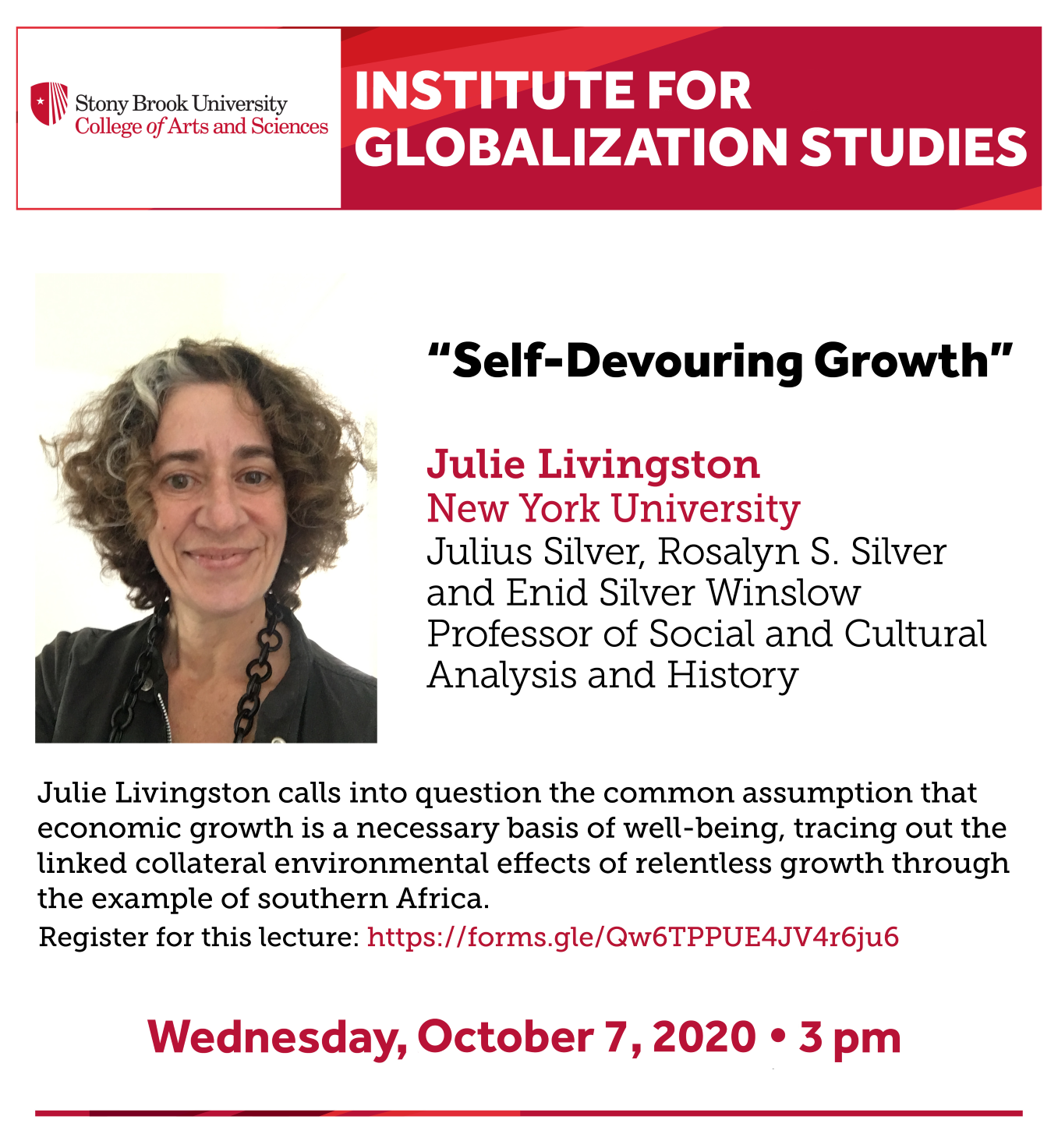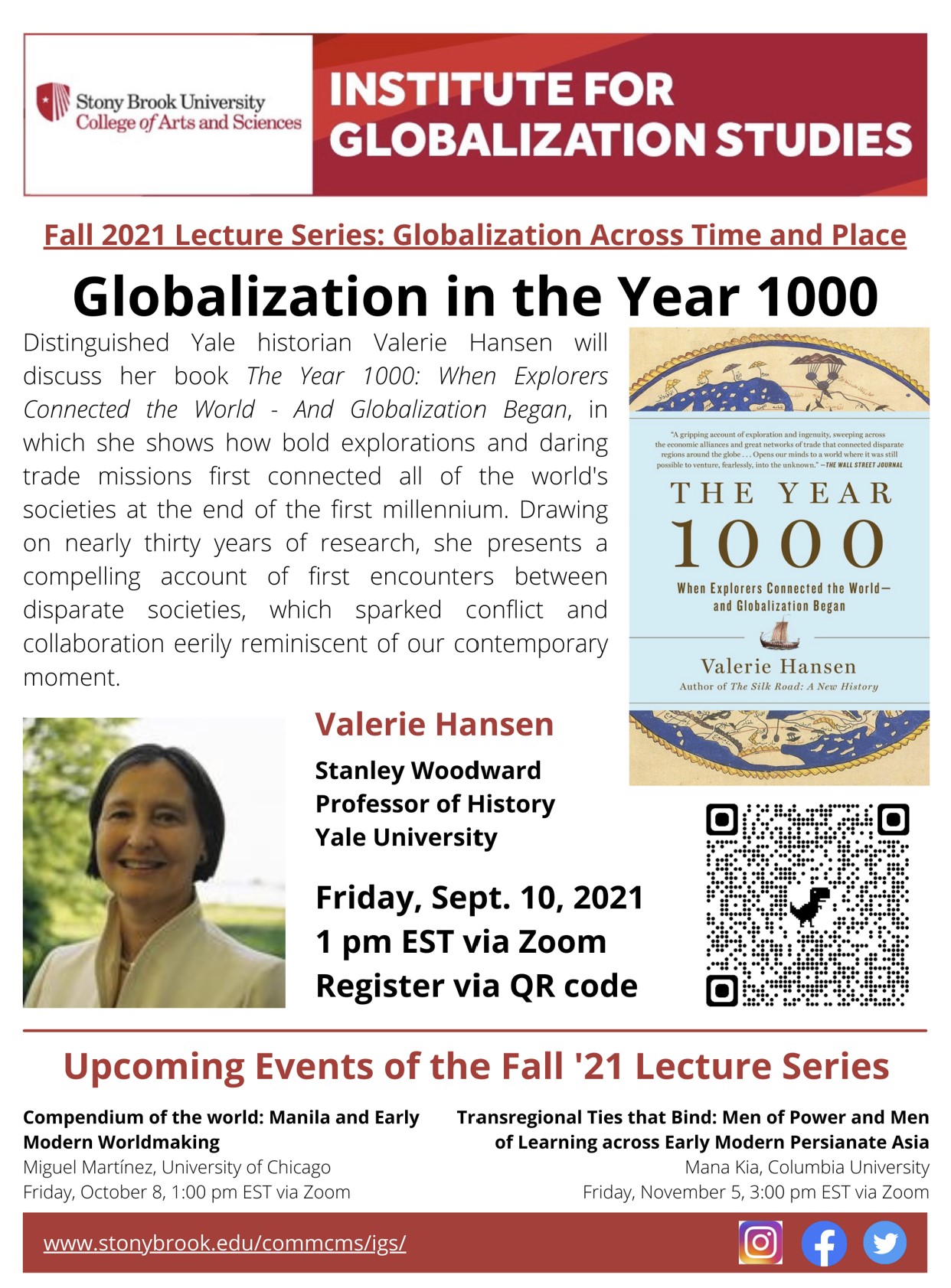Past Events
The Institute for Globalization Studies hosts several events each semester, including book talks, topical lectures, discussion panels, and career guidance for students. Here is an archive of our past events, organized by series and type. You can view descriptions, images, and recordings of events you missed or would like to see again.
Discussions and Book Launches
Globalization Studies Affiliated Faculty as well as other invited guests discuss their recently-published books and other projects.
Experts from the Amazon and beyond came together with the community to present their research and hold conversations about our global future! Learn more
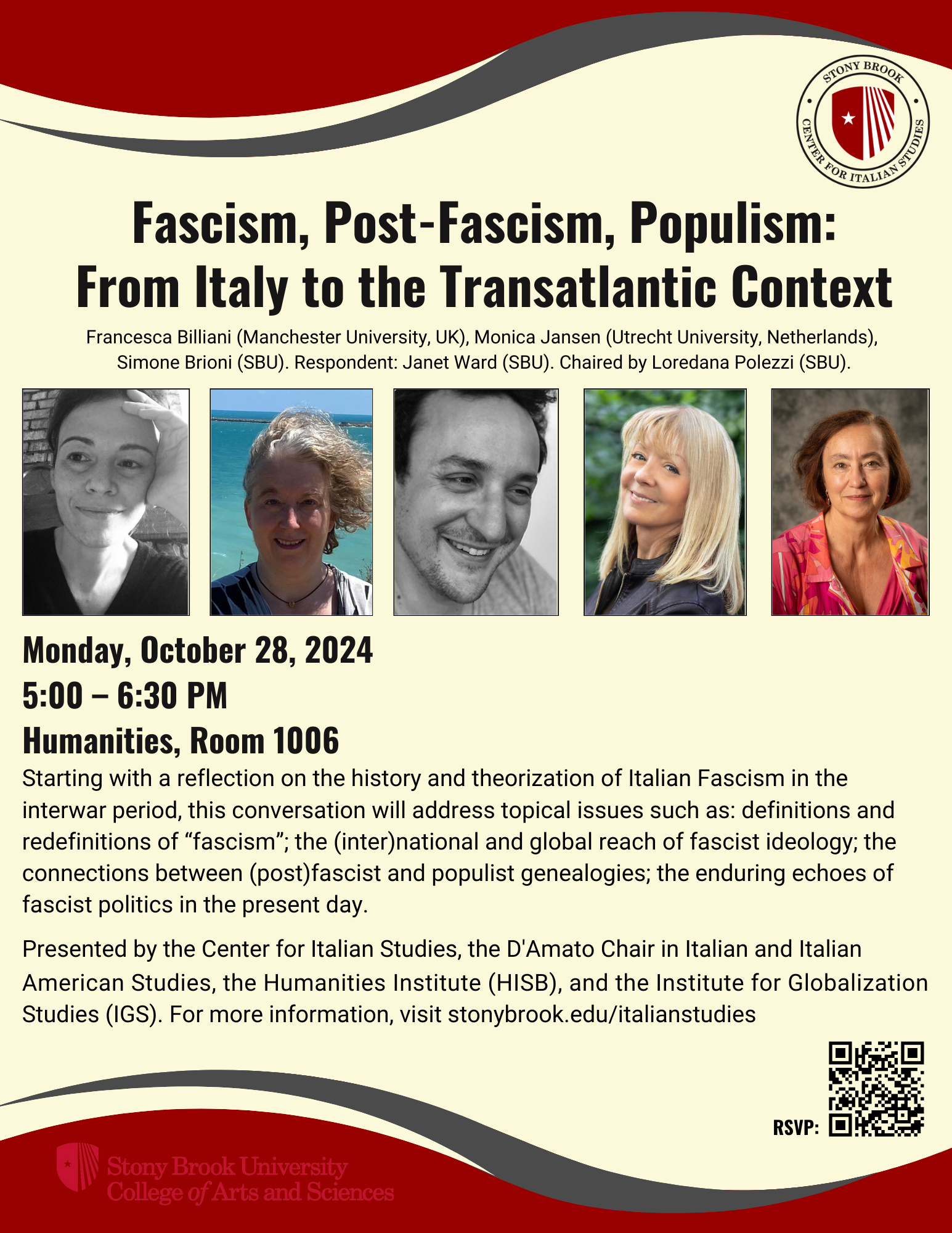
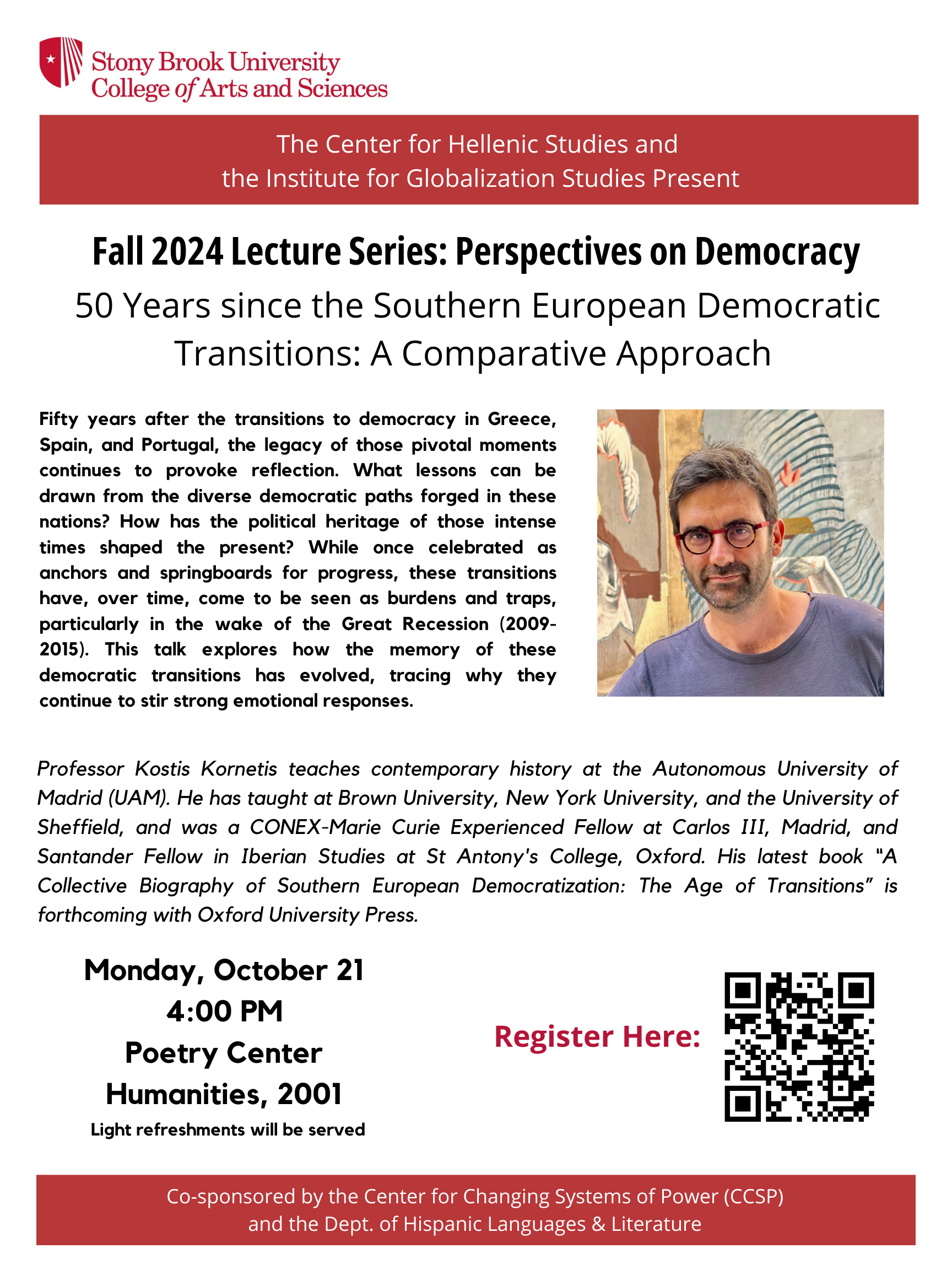
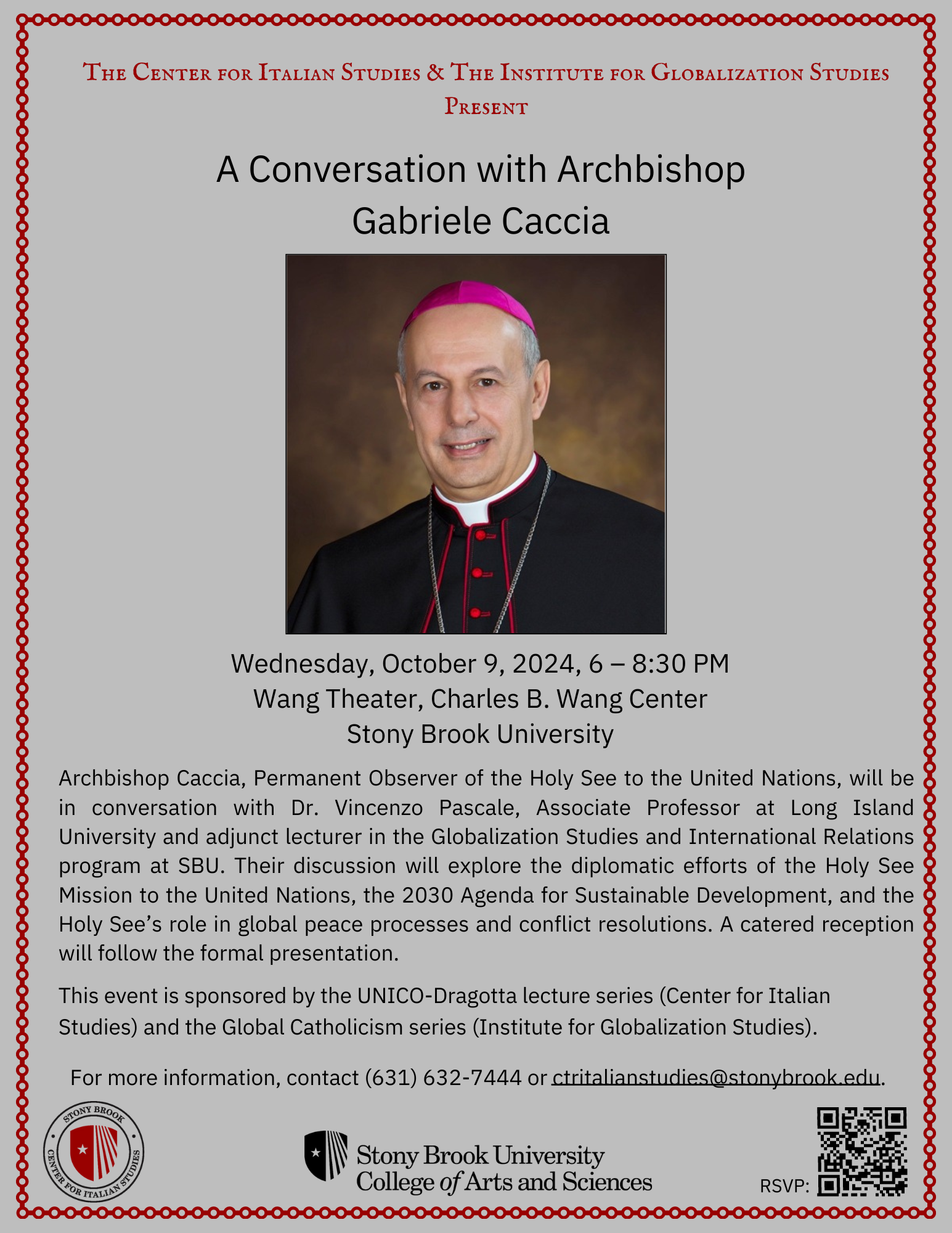
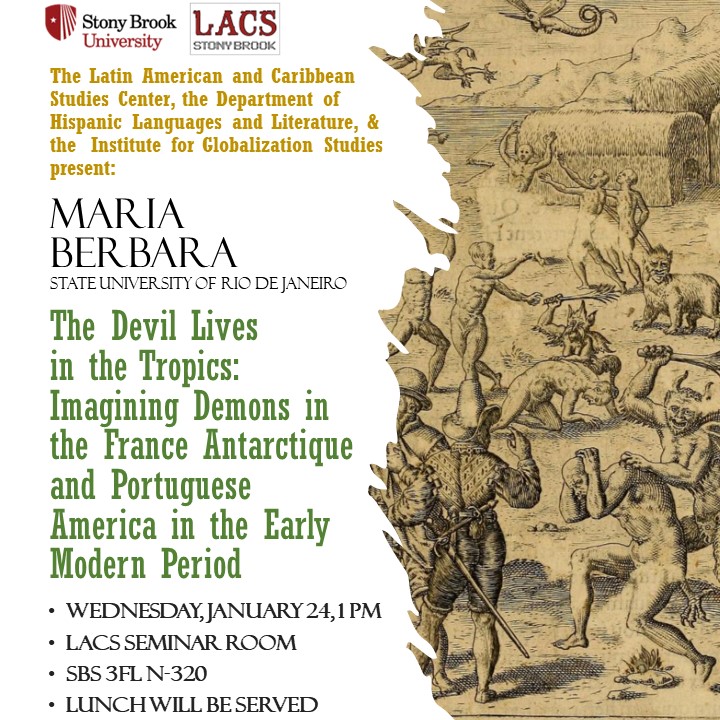
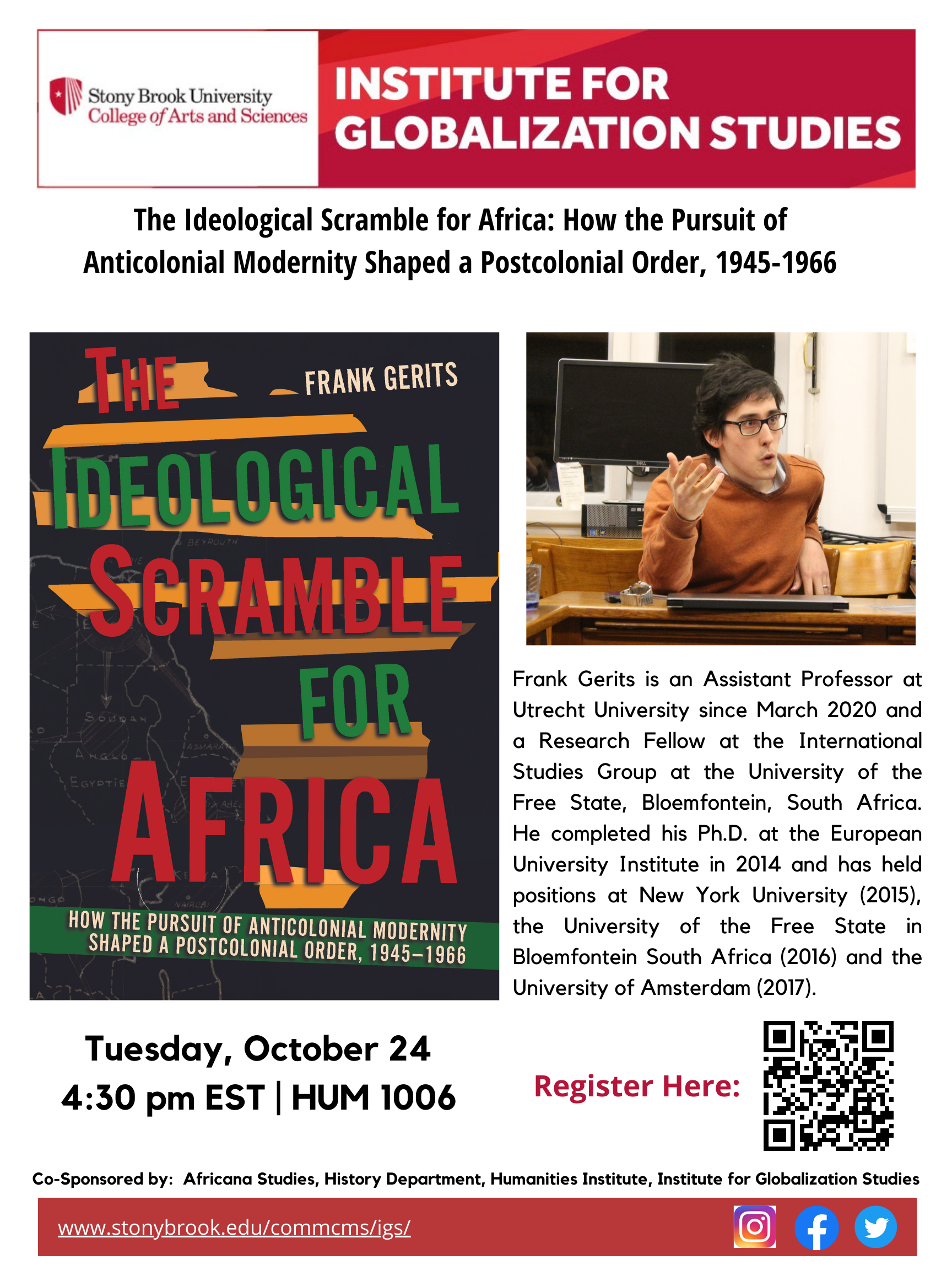
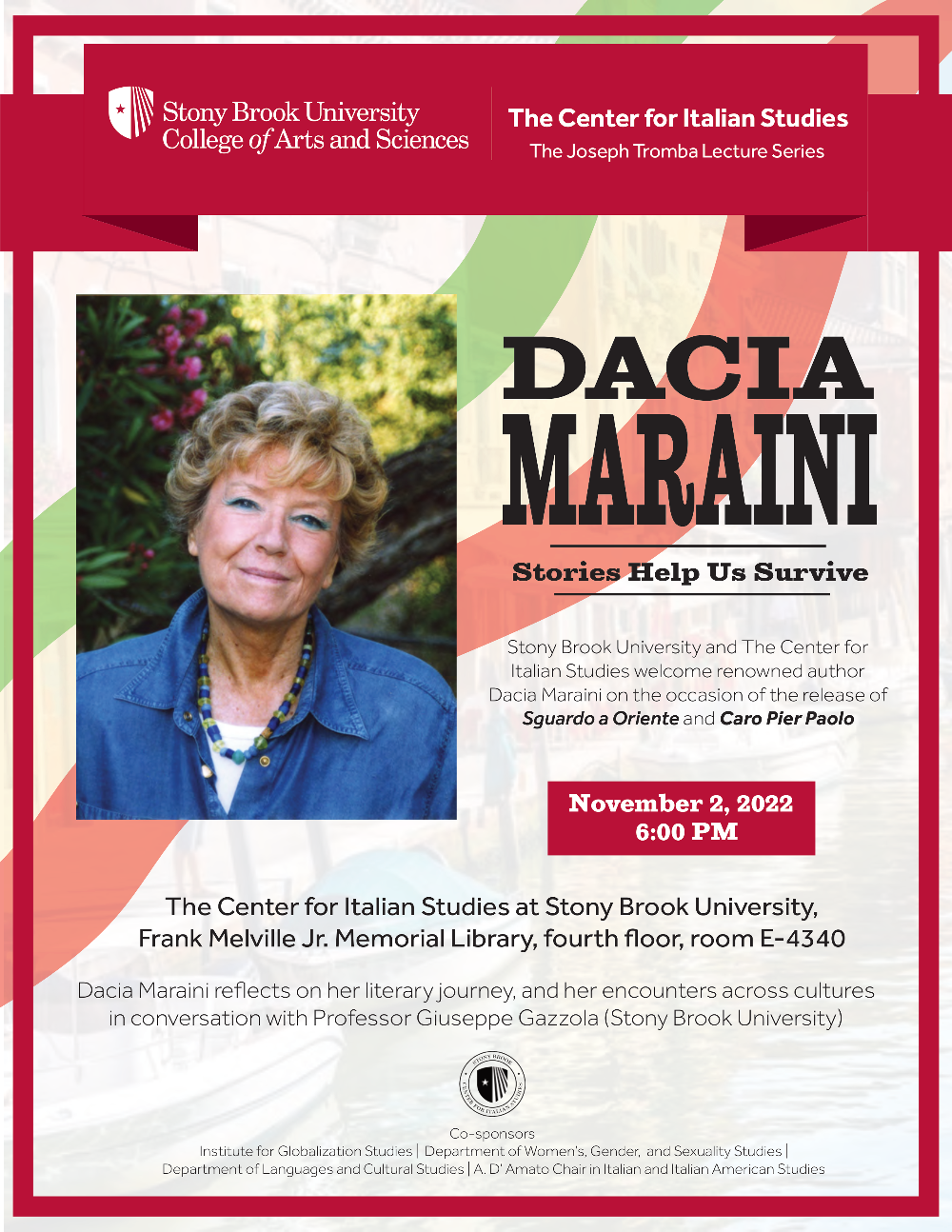
Dacia Maraini's discussed her latest book Caro Pier Paolo [Dear Pier Paolo] (2022) , recounting her journey made of dialogues and cultural exchanges with enigmatic poet, filmmaker and intellectual Paolo Pasolini: a trusted and admired friend who walked with her the winding path of life before his premature and shocking death.
Wednesday, November 2, 6pm
The event was held at the Center for Italian Studies at Stony Brook University, Frank Melville Jr. Memorial Library, Fourth Floor, Room E-4340
Co-sponsored with The Center for Italian Studies, Department of Women’s, Gender, and Sexuality Studies, Department of Languages and Cultural Studies, and A. D’ Amato Chair in Italian and Italian American Studies
Samanta Schweblin (Director, Hispanic Society of America)
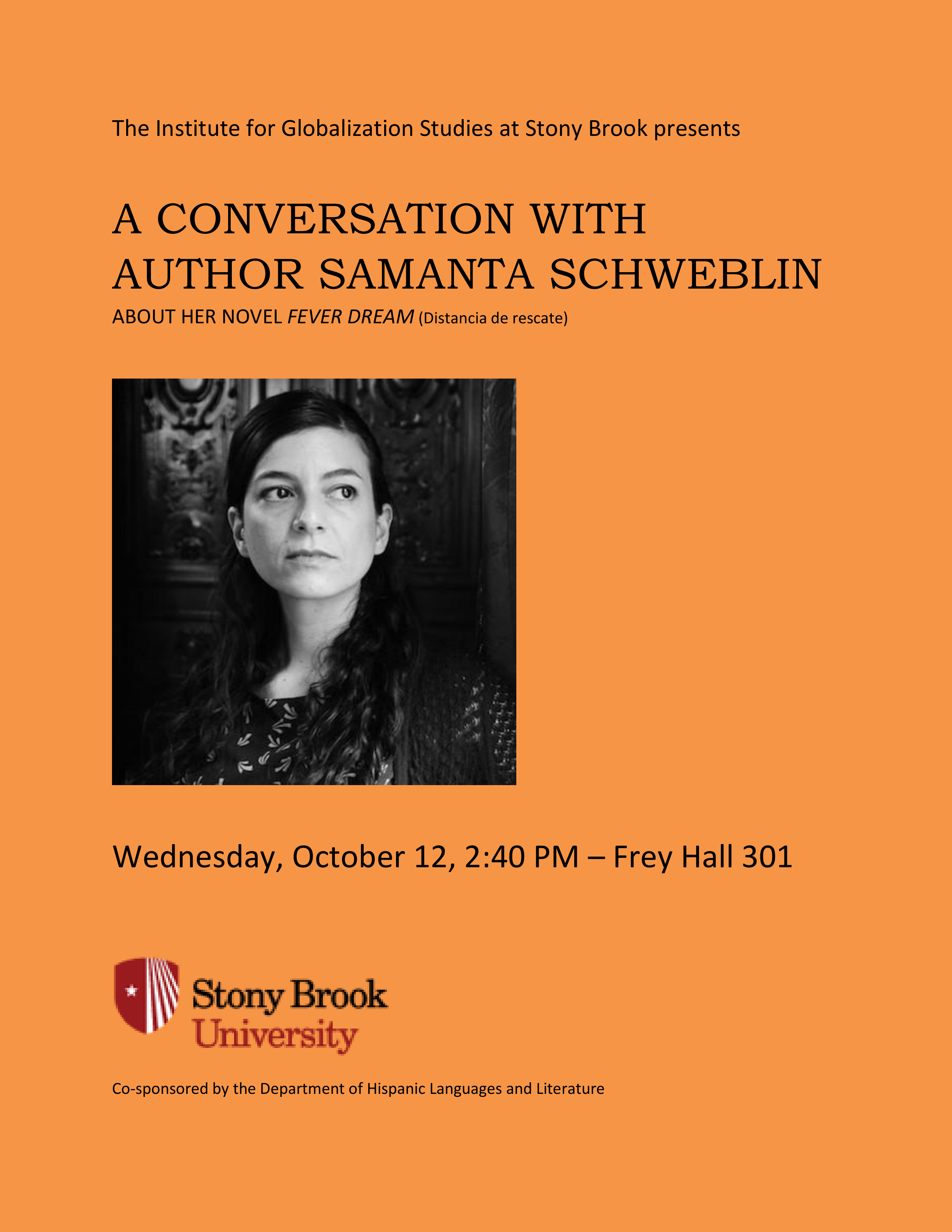
Wednesday, October 12, 2022
This event was held in-person in Frey Hall 301.Samanta Schweblin discussed her book "Fever Dream".
Co-sponosored by the Institute for Globalization Studies, Department of Hispanic Languages and Literature
Paul Gootenberg (SUNY Distinguished Professor of History & Sociology, Chair of History, Stony Brook University)
Thursday, April 14, 2022
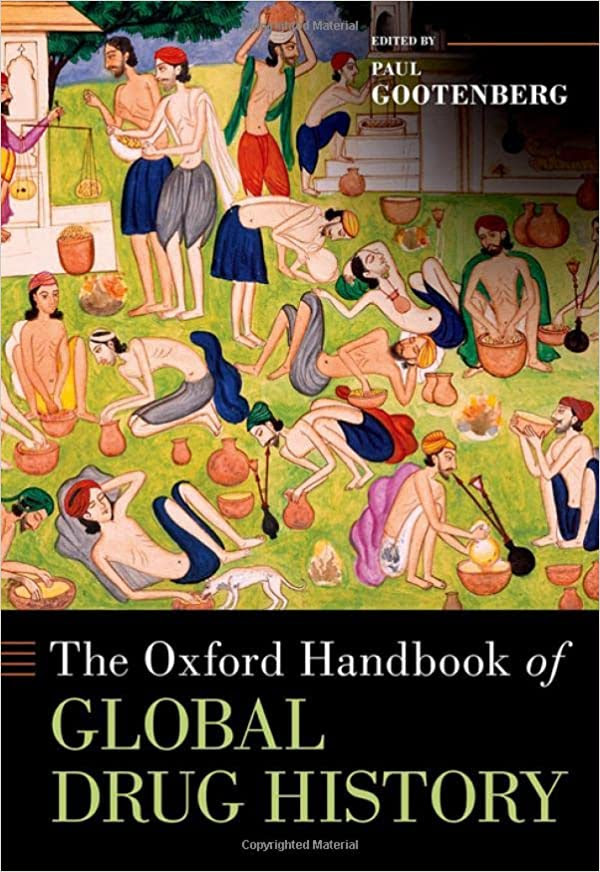
Drugs and their illicit use have long fascinated writers and the public at large. Informed by new interdisciplinary perspectives, a growing number of academically trained historians are now approaching drugs as a wide-open topic for serious research. The Oxford Handbook of Global Drug History (Oxford University Press, 2022) is the first major attempt by historians of drugs to take stock of the recent progress and directions of this field, utilizing both a global scope and long-term historical perspective. Thirty-five original essays simultaneously survey what is known historically about drugs across the world (in Europe, the Americas, Asia, and Africa) as well as illustrating their historical interconnections and implications today.
With Paul Gootenberg (general editor), SUNY Professor of History & Sociology, Chair of the History Department at Stony Brook University and current President of the Alcohol and Drugs History Society. Moderated by Liliana Dávalos (Stony Brook University), with commenters Peter Andreas (Brown University) and Erika Dyck (University of Saskatchewan.
You can view a recording of this event here.
Guillaume Kientz (Director, Hispanic Society of America)
Monday, November 15, 2021
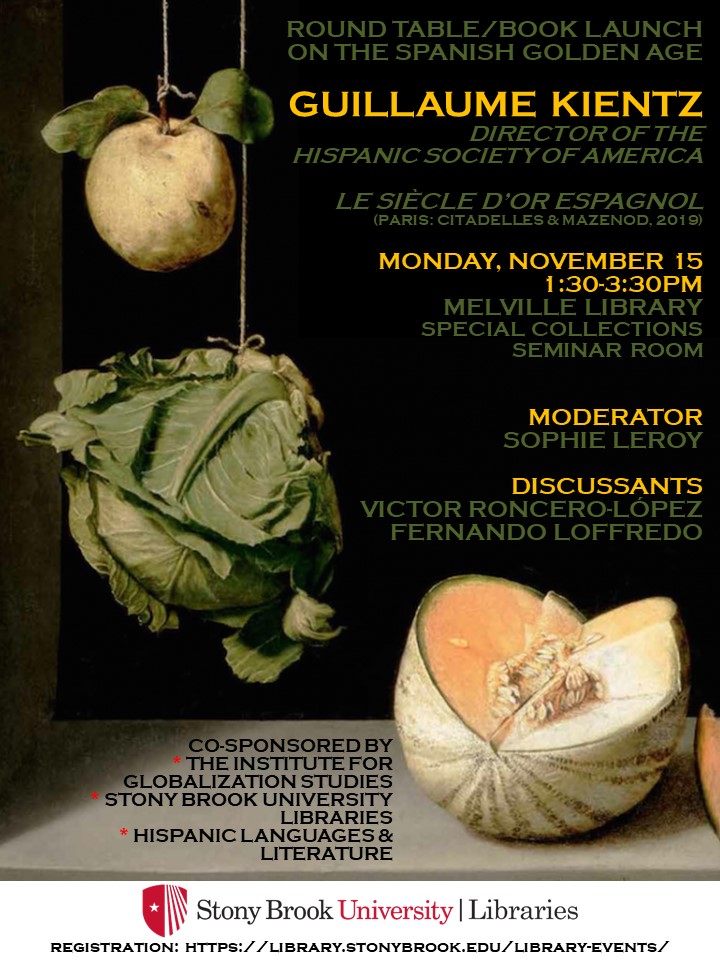
This event was held in-person in the Melville Library Special Collections Seminar Room.Guiilaume Kientze discussed his book on the Spanish Golden Age, moderated by Sophie Leroy with discussants Victor Roncero-Lopez and Fernando Loffredo.
Co-sponosored by the Institute for Globalization Studies, Stony Brook University Libraries, and the Department of Hispanic Languages & Literature
Julie Livingston (Julius Silver, Rosalyn S. Silver, and Enid Silver Winslow Professor of Social and Cultural Analysis and History, New York University)
Julie Livingston's work combines history, anthropology, and public health and contemplates the moral conditions, social practices, and African thought. Livingston’s talk, derived from her book, Self-Devouring Growth: A Planetary Parable as Told from Southern Africa (Duke University Press, 2019) contests the assumption that economic growth is a foundation of well-being and highlights the economic systems of the southern African nation of Botswana as an example.
View a recorded version of the talk here.
Said Amir Arjomand (Distinguished Service Professor of Sociology, Stony Brook University)
Wednesday, October 16, 2019. This event was held in-person.
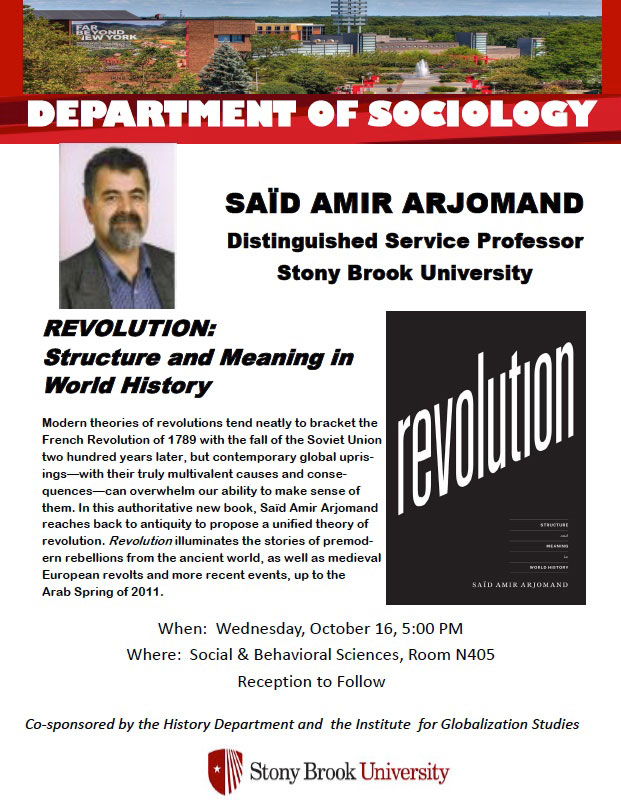
Said Amir Arjomand, Stony Brook University Distinguished Service Professor, presents Revolution: Structure and Meaning in World History (University of Chicago Press, 2019) which illuminates the stories of premodern rebellions from the ancient world, as well as medieval European revolts and more recent events, up to the Arab Spring of 2011.
Co-sponsored by the History Department and the Institute for Globalization Studies.
GLI Practitioner Series
The GLI Practitioner Series brings people working in global careers to the Stony Brook campus (both virtually and in-person) to meet with students, share their experiences, and provide informal mentorship.

Chloe Puett is a researcher in global public health nutrition. She is affiliated with the Program in Public Health at Stony Brook University and is an independent consultant for several global health and nutrition organizations. She has 20 years experience in the fields of public health nutrition, food security and global development. Her applied economic evaluation work focuses on interventions addressing child wasting and stunting in low- and middle-income countries. Her research interests include using findings from economic analysis, especially measurement of household costs, to understand community barriers to intervention access, utilization and effectiveness.
Wednesday, March 20, 2024
The event was held at the Charles B. Wang Center at Stony Brook University.

Dave Steinbach is an independent consultant working in the field of climate change policy and green finance. His main focus is on the intersection between climate adaptation and financing. Dave worked for 4 years as at the environmental thinktank the International Institute of Environment and Development (IIED) where he was a Researcher in the Climate Change Group. He has also worked in the private sector for the environmental consultancy Ricardo Energy & Environment, and for Global Affairs Canada supporting the implementation of adaptation initiatives in Ghana.
Wednesday, February 28, 2024
The event was held at the Charles B. Wang Center at Stony Brook University.
To watch a recording of our conversation with Mr. Steinbach, moderated by Professor Sophia Boutilier, click here.

Christina Gordon is an Advisor for Gender Equality and Social Justice (GESJ) at Save the Children US (SCUS), where she provides leadership in ensuring that GESJ are mainstreamed across research and programs. Christina works closely with program teams to support research processes including conducting gender and power analyses, supporting program development processes, contributing to staff professional development on GESJ, and building staff networks.
Wednesday, November 29, 2024
The event was held at the Charles B. Wang Center at Stony Brook University.

Nancy Khweiss is currently leading the Rebuilding the Women's Movement initiative in UN Women's Afghanistan Country Office. She has worked for the past twelve years at UN Women, including serving as the Deputy Head of the Generation Equity Forum Secretariat from 2019-2022. Prior to this she was with the Fund for Gender Equality from 2011-2019, where she held various positions including Fund Manager.
Wednesday, October 4, 2024
The event was held at the Charles B. Wang Center at Stony Brook University.
GLI Student Mixers
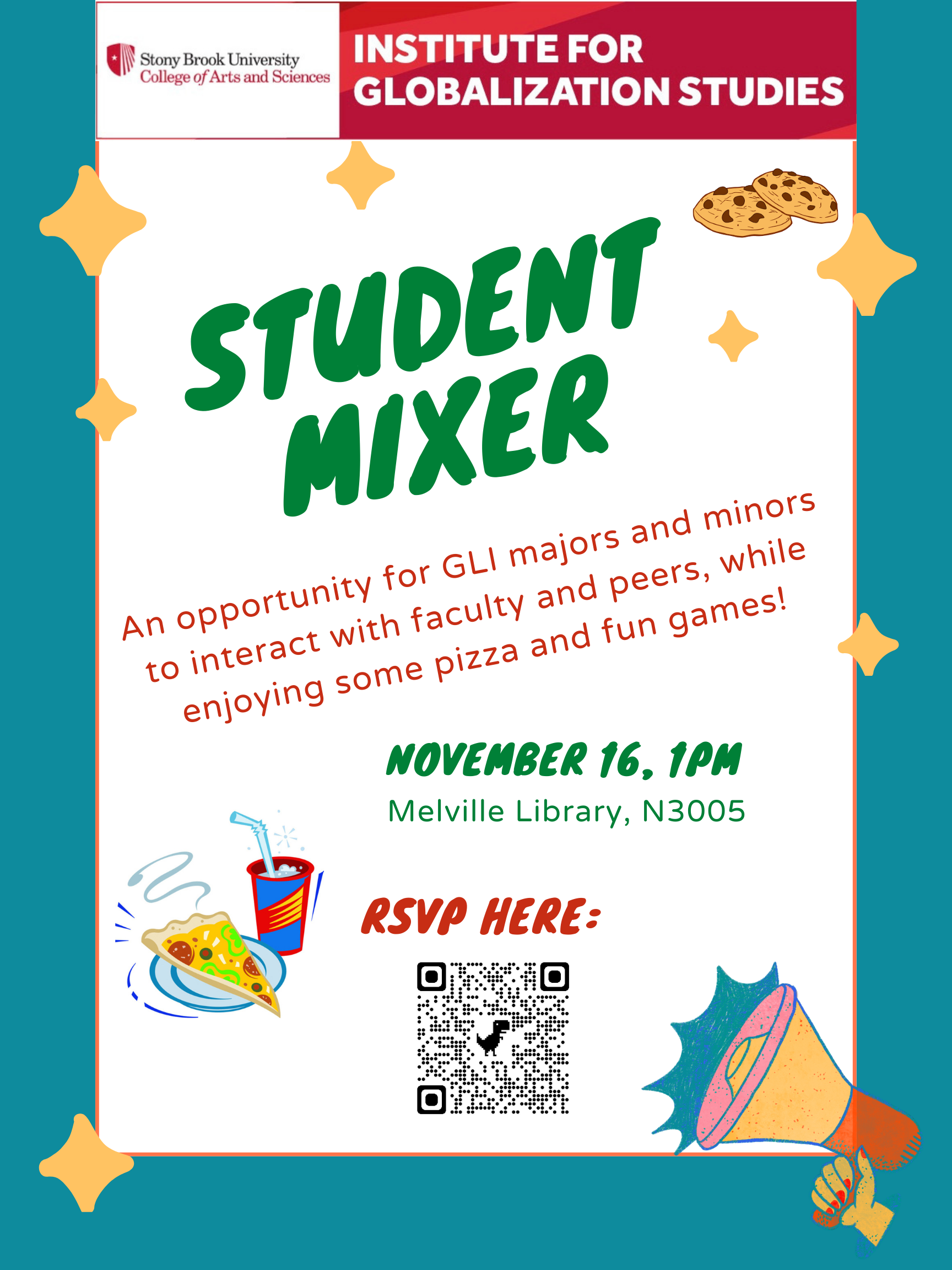
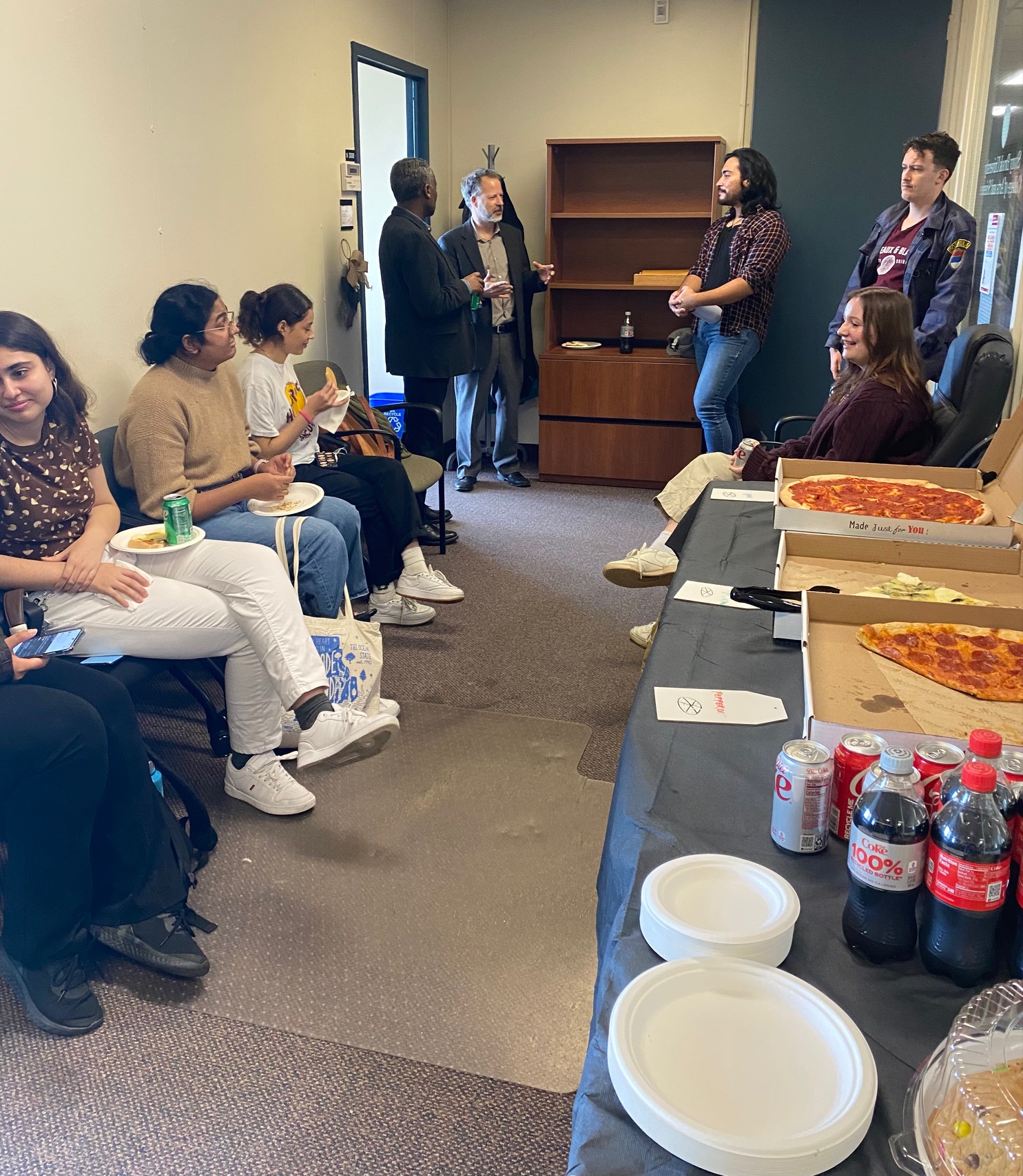
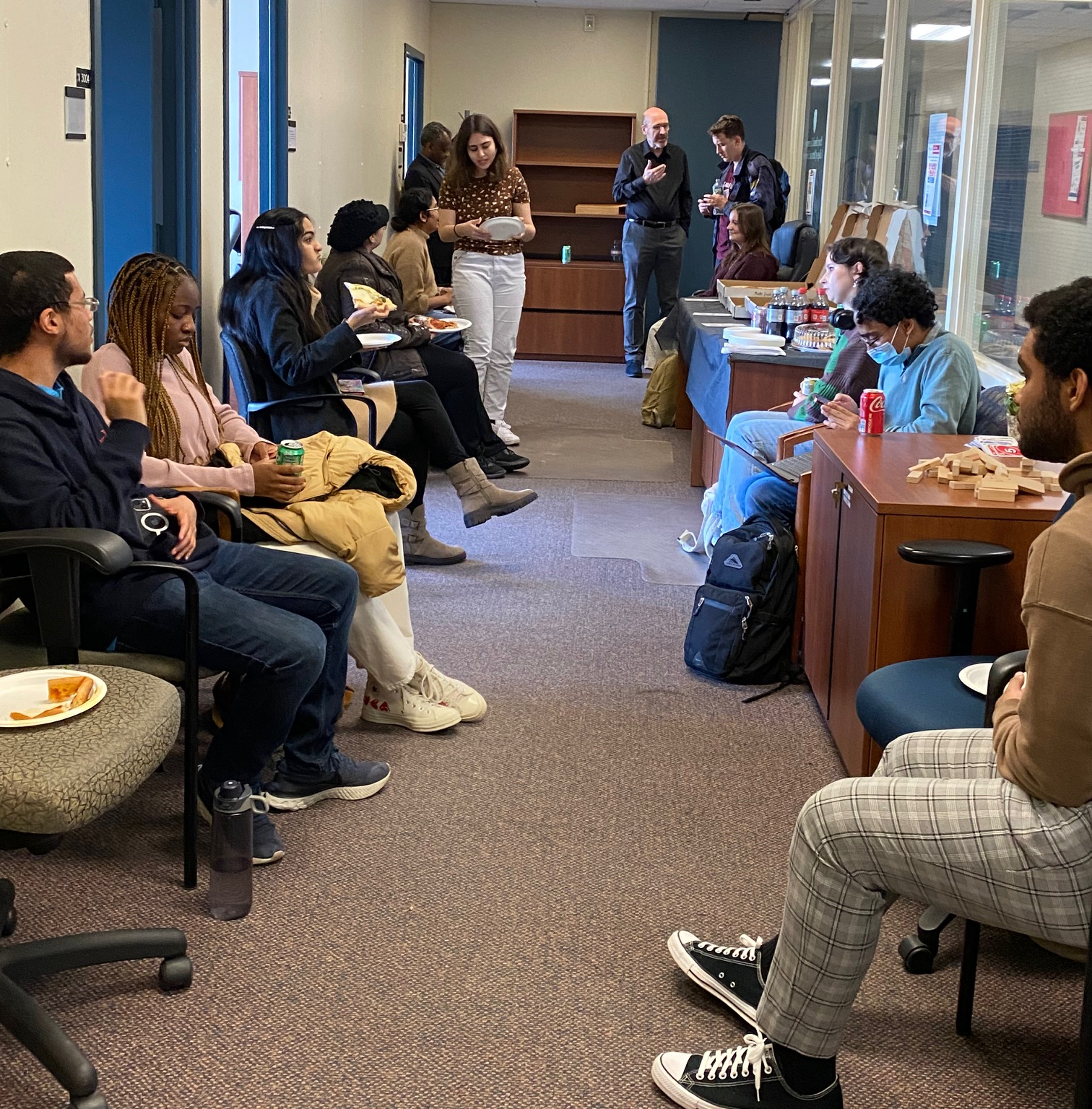
The first post-pandemic student mixer gave GLI majors and minors an opportunity to meet their faculty and peers, and relax before the holidays on November 16, 2022.
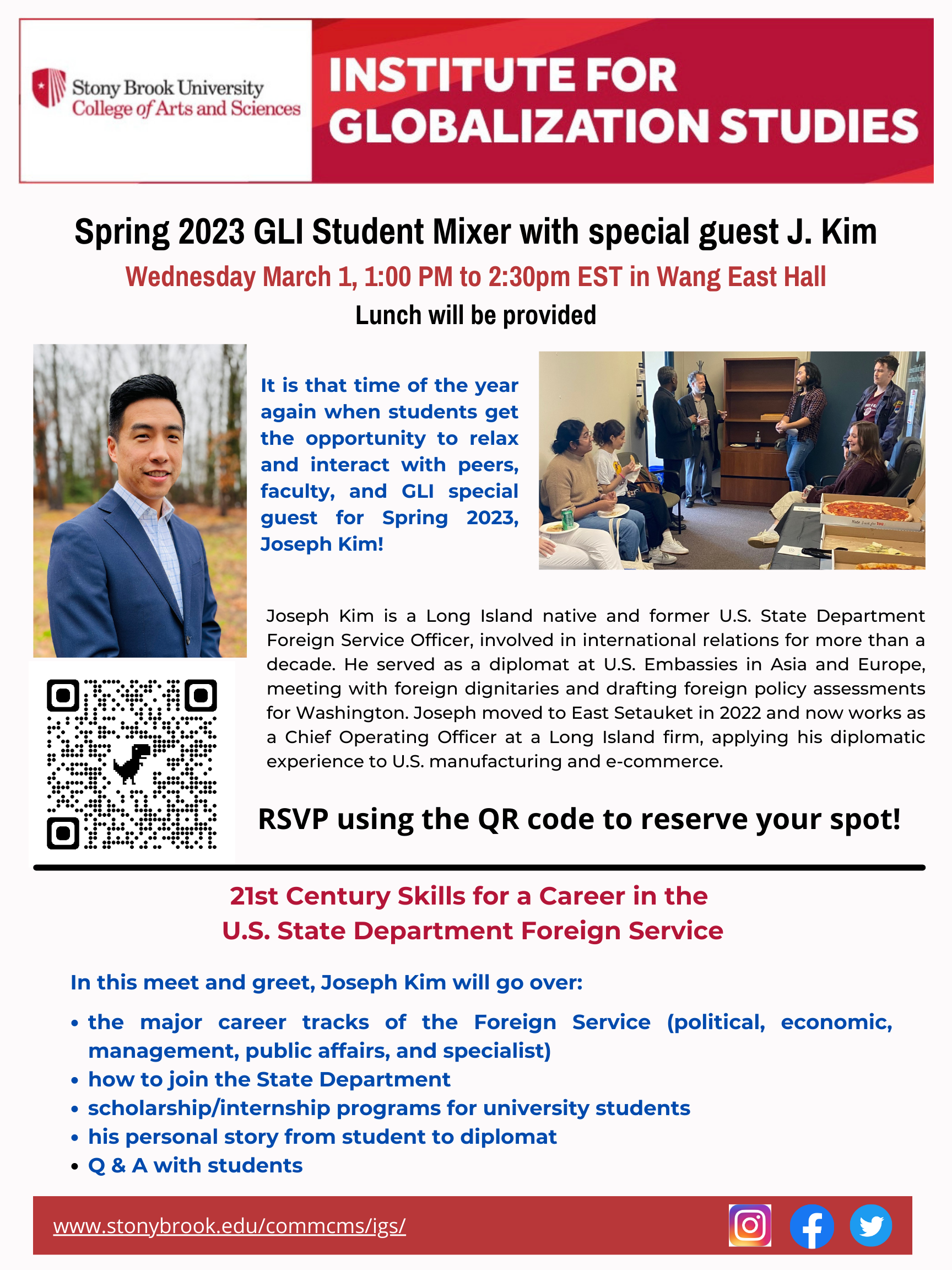
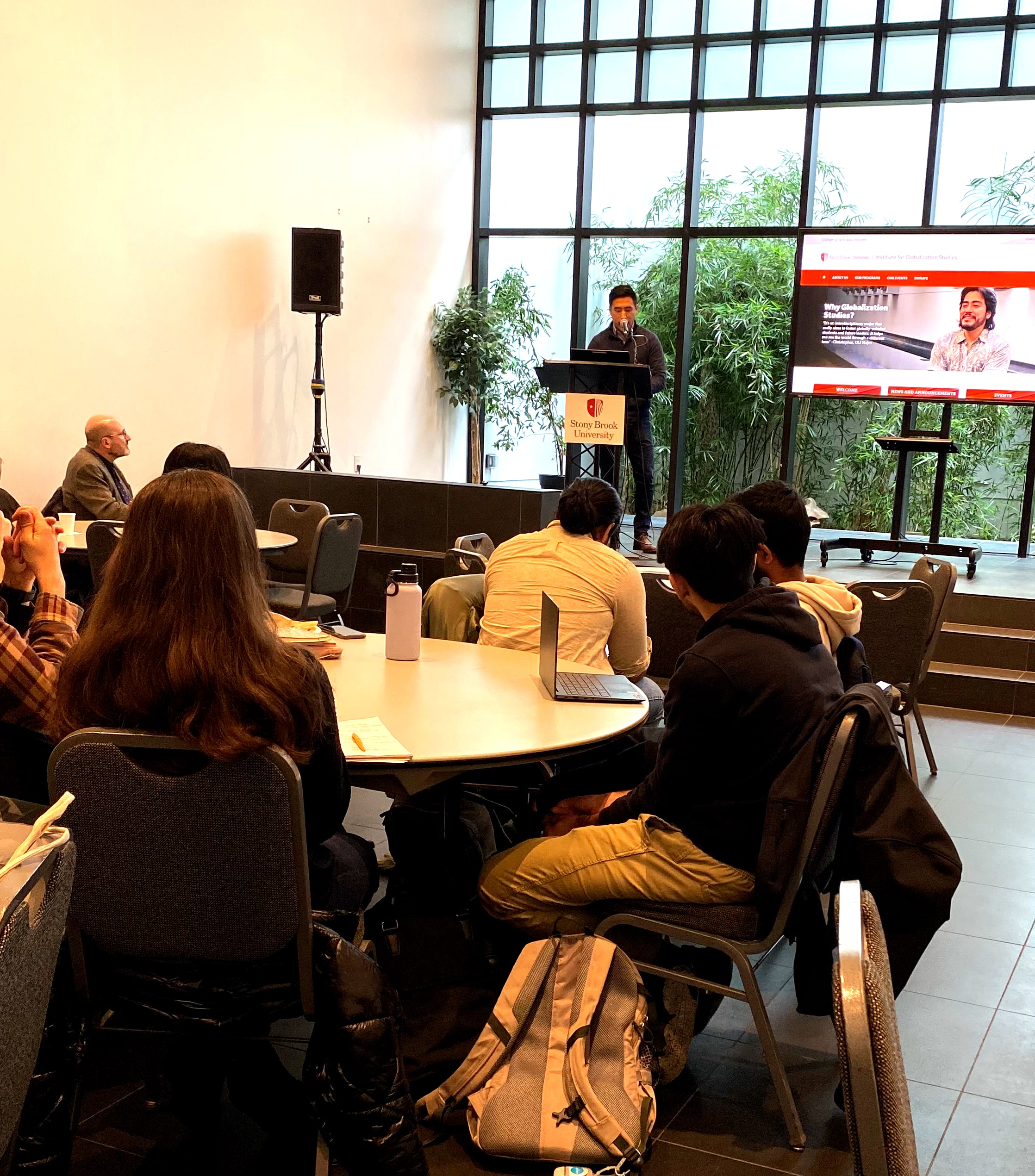
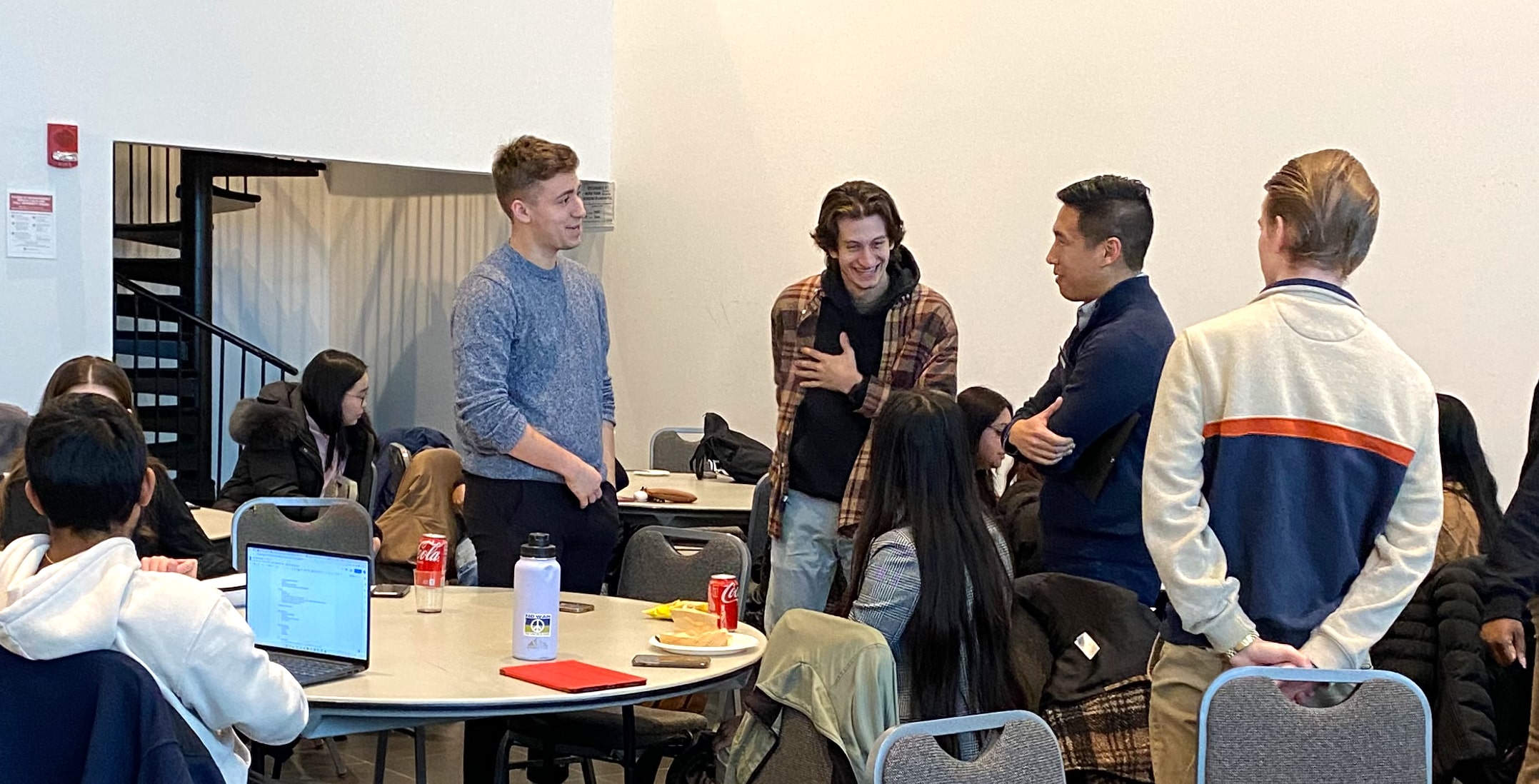
The spring student mixer on March 1, 2023 gave GLI majors and minors an opportunity to meet Joseph Kim, former U.S. State Department Foreign Service Officer.
In this meet and greet, Joseph Kim went over:
- the major career tracks of the Foreign Service (political, economic, management, public affairs, and specialist)
- how to join the State Department
- scholarship/internship programs for university students
- his personal story from student to diplomat
- Q & A with students

On November 1, 2023, GLI hosted its Fall Mixer. Students and faculty got the chance to meet in a relaxed setting, discuss the program, and enjoy a lunch from Panera. Stay tuned for future Mixers!
Spring 2023 Lecture Series
Professor Turhan Canli (Professor, Psychology, SBU)
Brianna Gonzalez (Graduate Student, Psychology, SBU)
Donya Ziadlou (Graduate Student, Psychology, SBU)
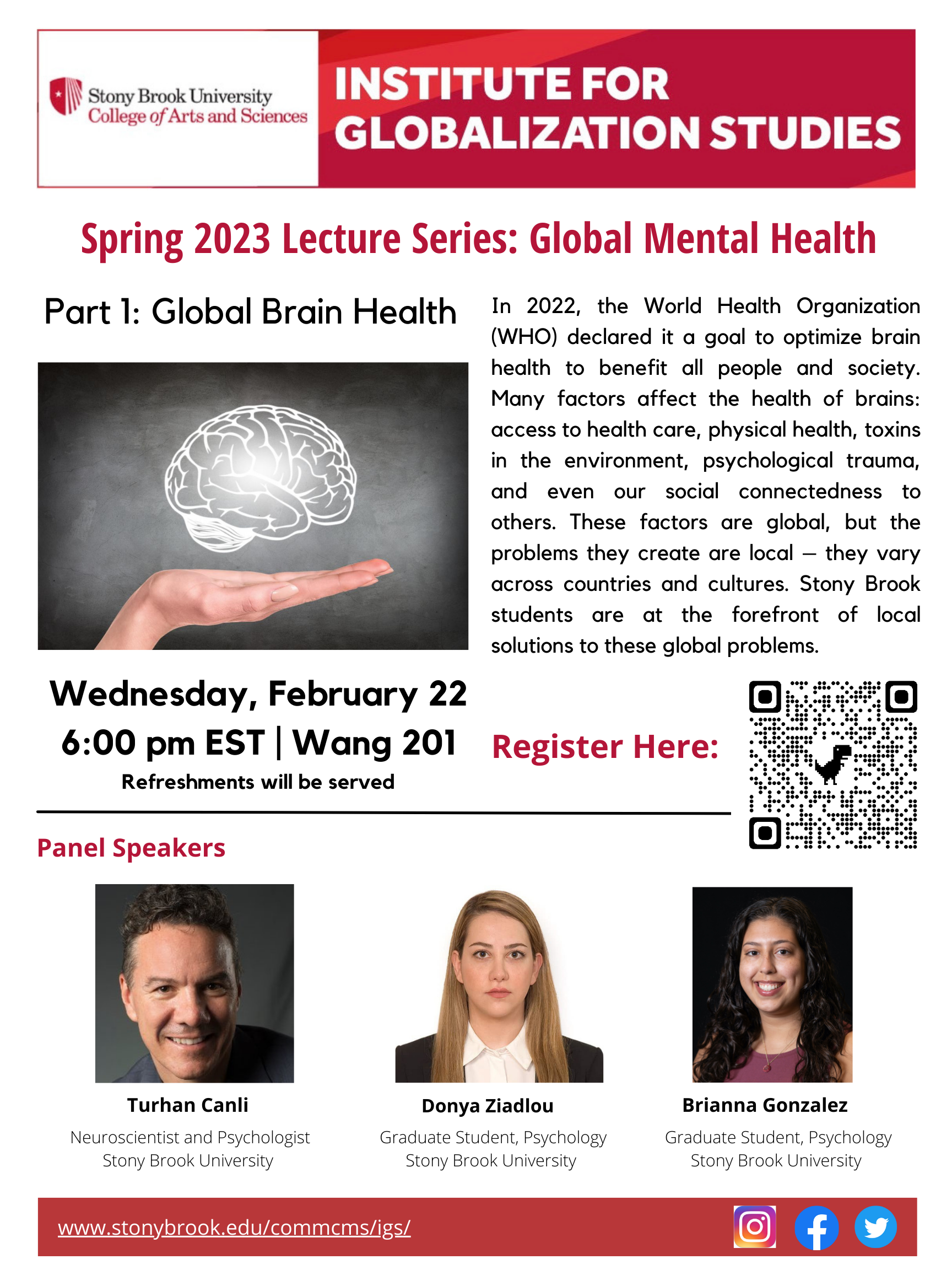
In 2022, the World Health Organization (WHO) declared it a goal to optimize brain health to benefit all people and society. Many factors affect the health of brains: access to health care, physical health, toxins in the environment, psychological trauma, and even our social connectedness to others. In this event, the panelists discussed that even though hese factors are global, the problems they create are local – they vary across countries and cultures.
Martin Rozumek is a lawyer and holds a doctoral degree in international public law from the Masaryk University in Brno, Czech Republic. He worked in various positions with UNHCR in the Czech Republic and Pakistan, as well as at the Brno-based Society of Citizens Assisting Immigrants and in a private law-firm. He was a head of the Czech Government Human Rights Committee for Rights of Foreigners. His expertise includes refugee and immigration law and practices, EU law, advocacy, and international human rights law. In 2022, he received the Fulbright Scholarship to research climate migration at the Comparative Center for Immigration Studies in the University of California–San Diego.
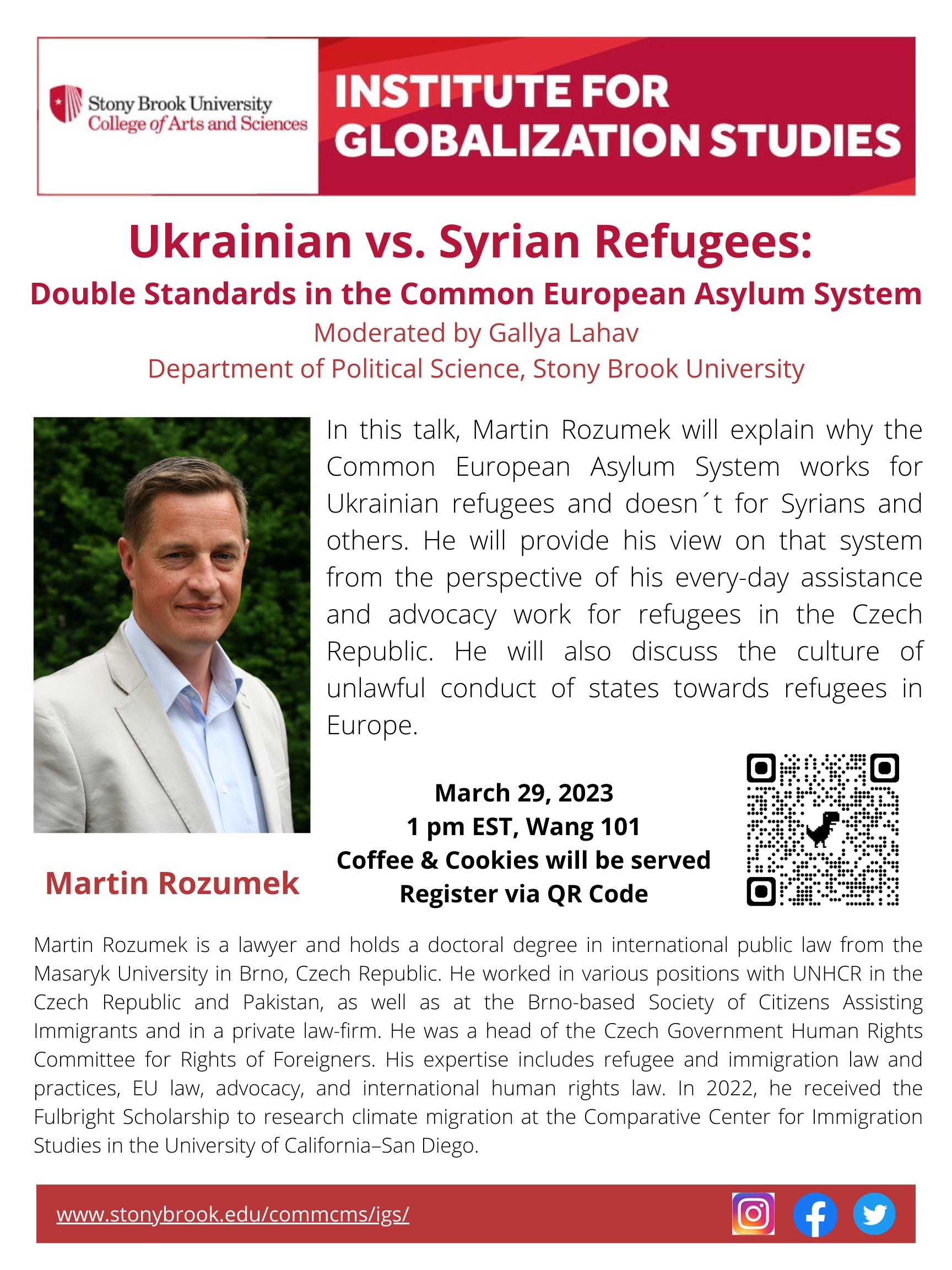 In this talk, Martin Rozumek explained why the Common European Asylum System works
for Ukrainian refugees and does not for Syrians and others. He provided his view on
that system from the perspective of his every-day assistance and advocacy work for
refugees in the Czech Republic. He also discussed the culture of unlawful conduct
of states towards refugees in Europe.
In this talk, Martin Rozumek explained why the Common European Asylum System works
for Ukrainian refugees and does not for Syrians and others. He provided his view on
that system from the perspective of his every-day assistance and advocacy work for
refugees in the Czech Republic. He also discussed the culture of unlawful conduct
of states towards refugees in Europe. The event was a great success with a full-house of very engaged GLI and Political Science students.

Fall 2022 Lecture Series
Michael Gomez (New York University Silver Professor)
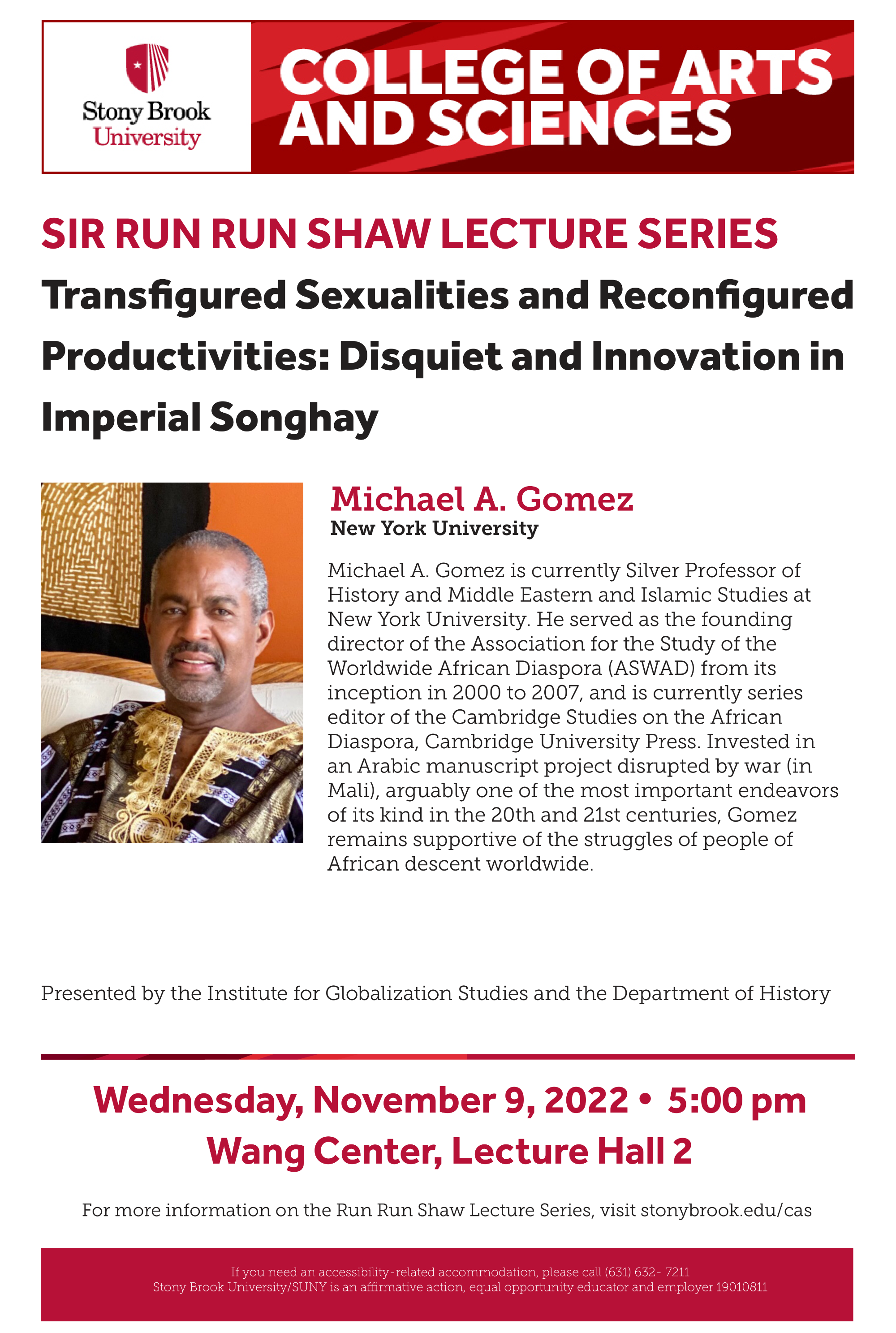
Wednesday, November 9 at 5 PM
Charles B. Wang Center, Lecture Hall 2
Robert Vidigal (Research Data Scientist
Center for Social Media and Politics, New York University)Wenesday, October 26, 2022
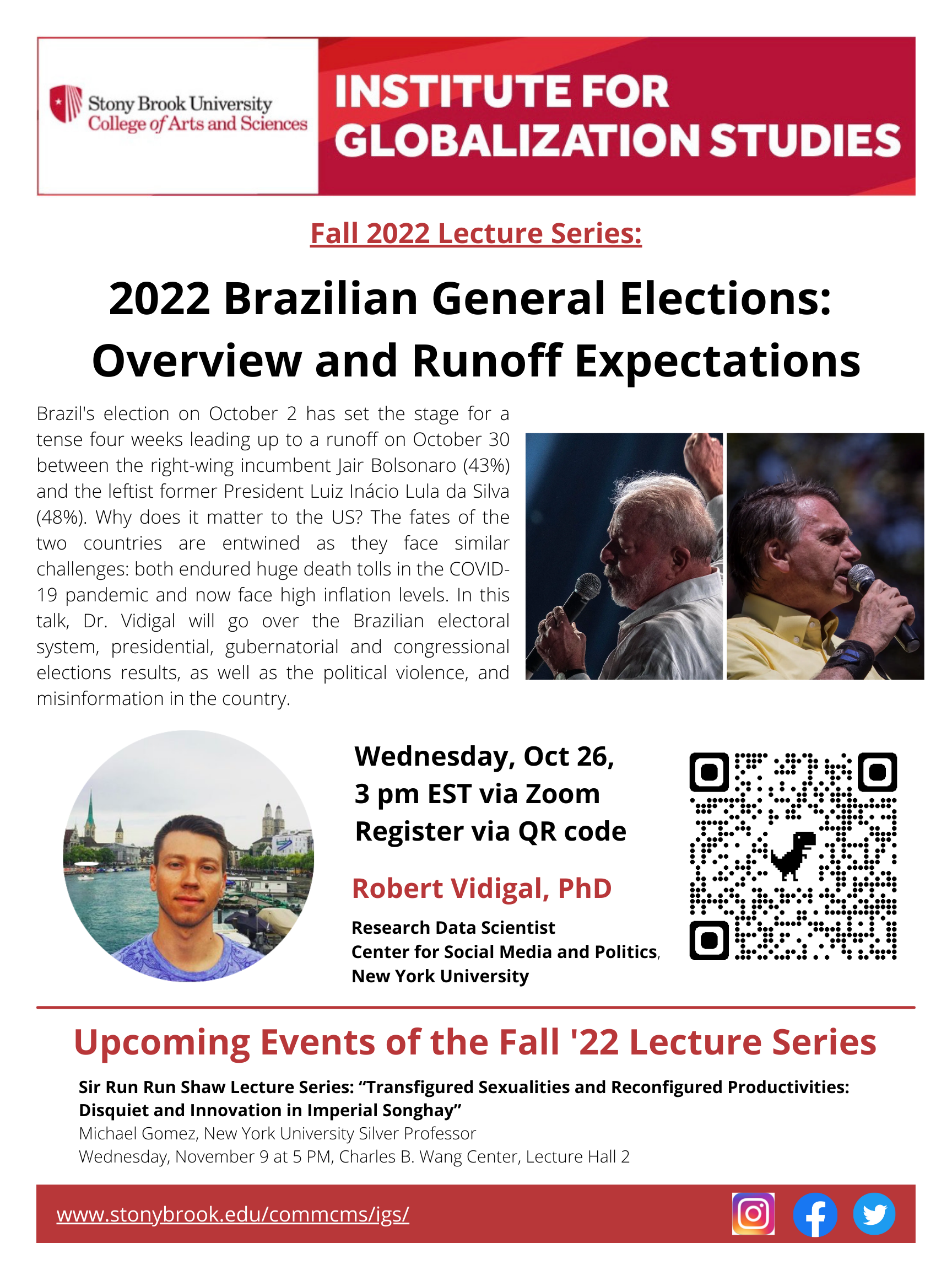 Drawing from his research on Authoritarianism and Right-Wing Voting in Brazil, Dr. Vidigal went over the Brazilian electoral system, results of the presidential,
gubernatorial and congressional elections over the past few years, as well as the
hyper-fragmented party system, political violence, and misinformation in the country.
Drawing from his research on Authoritarianism and Right-Wing Voting in Brazil, Dr. Vidigal went over the Brazilian electoral system, results of the presidential,
gubernatorial and congressional elections over the past few years, as well as the
hyper-fragmented party system, political violence, and misinformation in the country.You can view a recording of the event here.
Spring 2022 Lecture Series: Climate Change and Global Migration Patterns
This series of two panels and one lecture explored the impact of climate change on human migration, including discussions of recent research, perspectives of both scholars and activists, and consideration of what policy can and should arise out of these issues.
Susana Adamo (Center for International Earth Science Information Network, The Climate School, Columbia University)
Wednesday, April 6, 2022
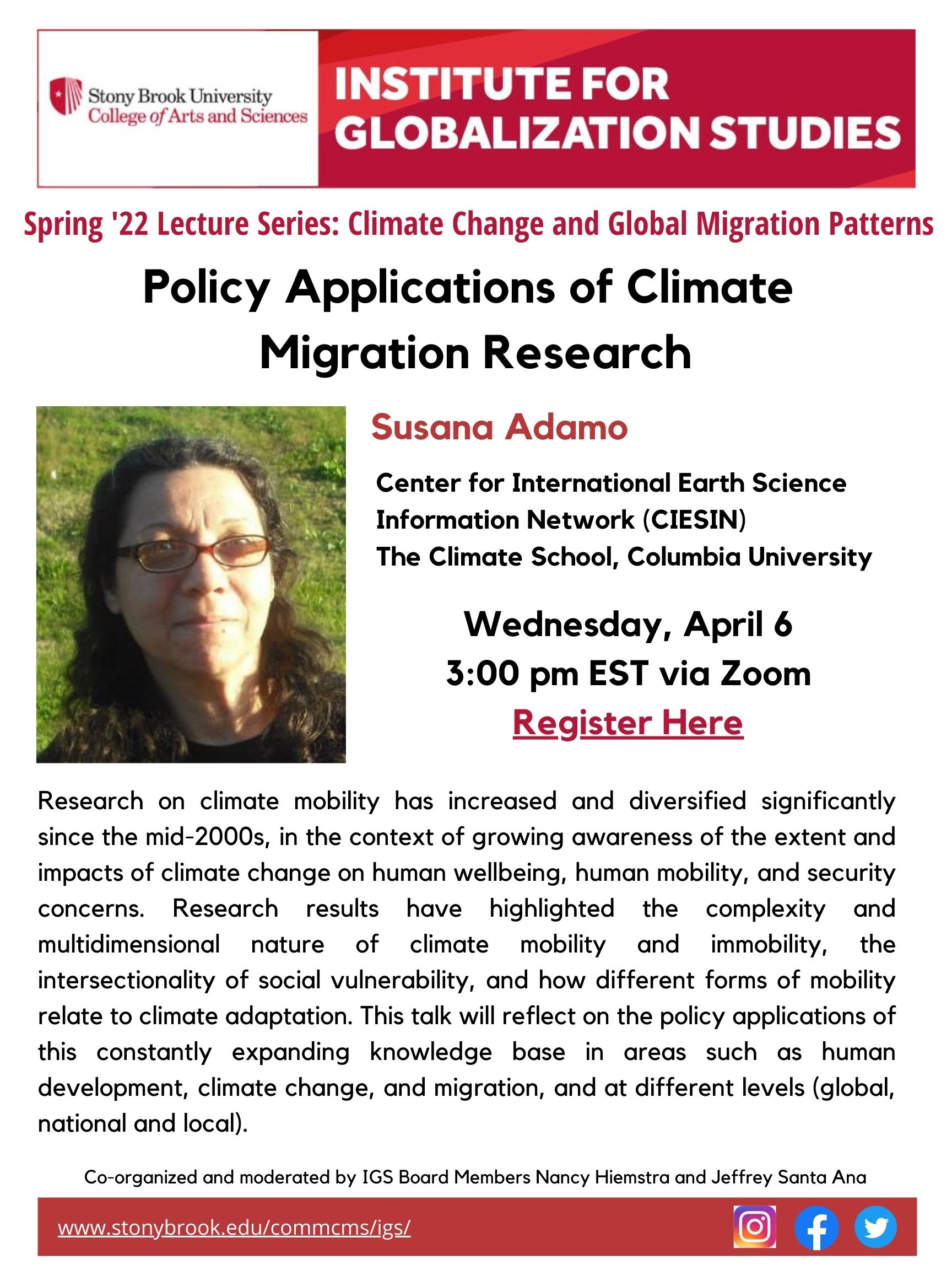
Research on climate mobility has increased and diversified significantly since the mid-2000s, in the context of growing awareness of the extent and impacts of climate change on human wellbeing, human mobility, and security concerns. Research results have highlighted the complexity and multidimensional nature of climate mobility and immobility, the intersectionality of social vulnerability, and how different forms of mobility relate to climate adaptation. This talk reflected on the policy applications of this constantly expanding knowledge base in areas such as human development, climate change, and migration, and at different levels (global, national and local).
You can view a recording of the event here.
Craig Santos Perez, (English, University of Hawai'i)
Aryaana Khan (Biology, CUNY)
Xiaojing Zhou (English, University of the Pacific)
Heidi Amin-Hong (English, UC Santa Barbara)Wednesday, March 9, 2022
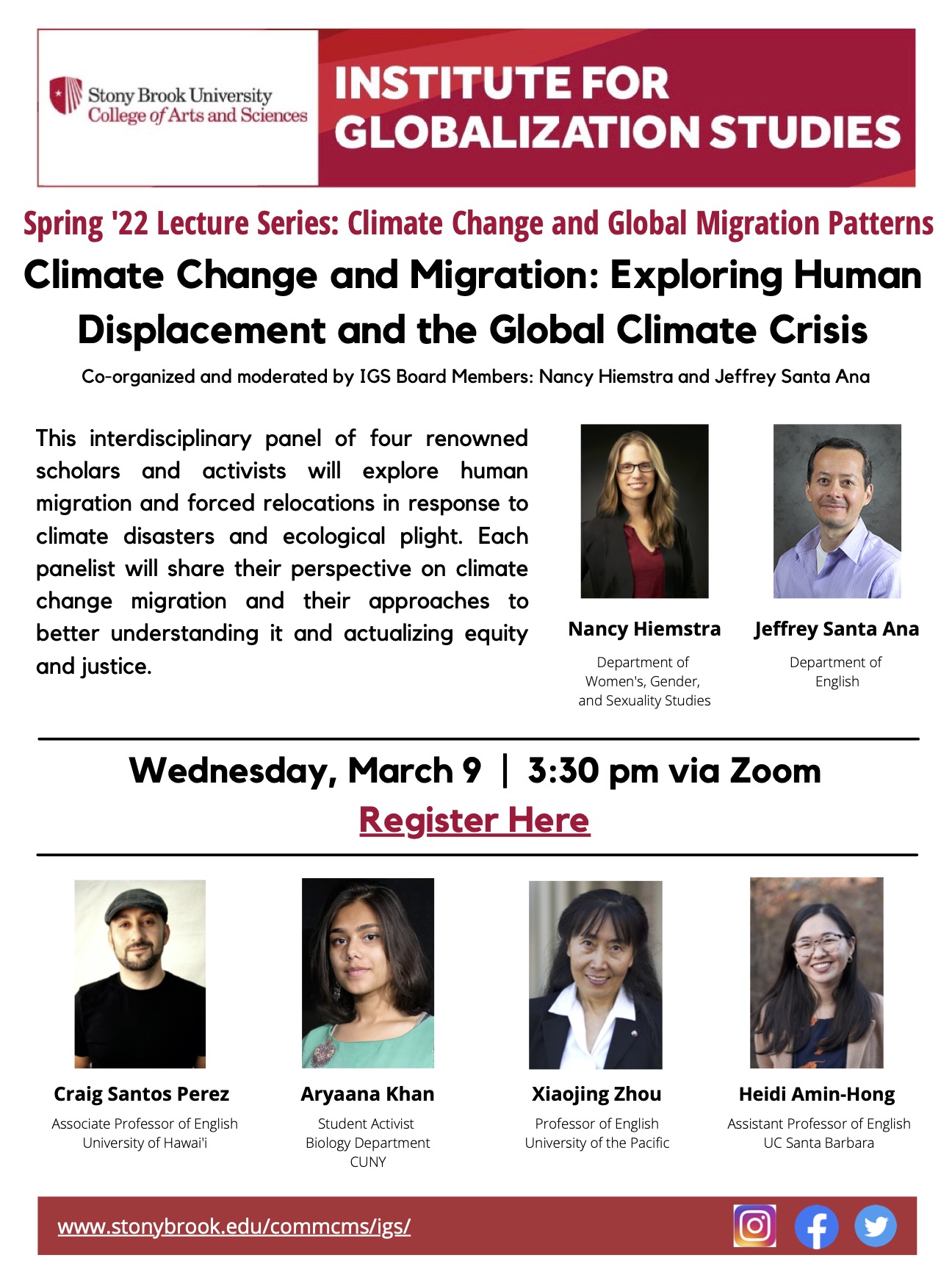
This interdisciplinary panel of four renowned scholars and activists will discussed human migration and forced relocations in response to climate disasters and ecological plight. Each panelist shared their perspective on climate change migration and their approaches to better understanding it and actualizing equity and justice.
You can view a recording of this event here.
Mark Chambers (Africana Studies, Stony Brook University)
Sara Hamideh (School of Marine and Atmospheric Sciences, Stony Brook University)
Gallya Lahav (Political Sciences, Stony Brook University)
Javier Uriarte (Hispanic Languages and Literature, Stony Brook University)Wednesday, February 2, 2022
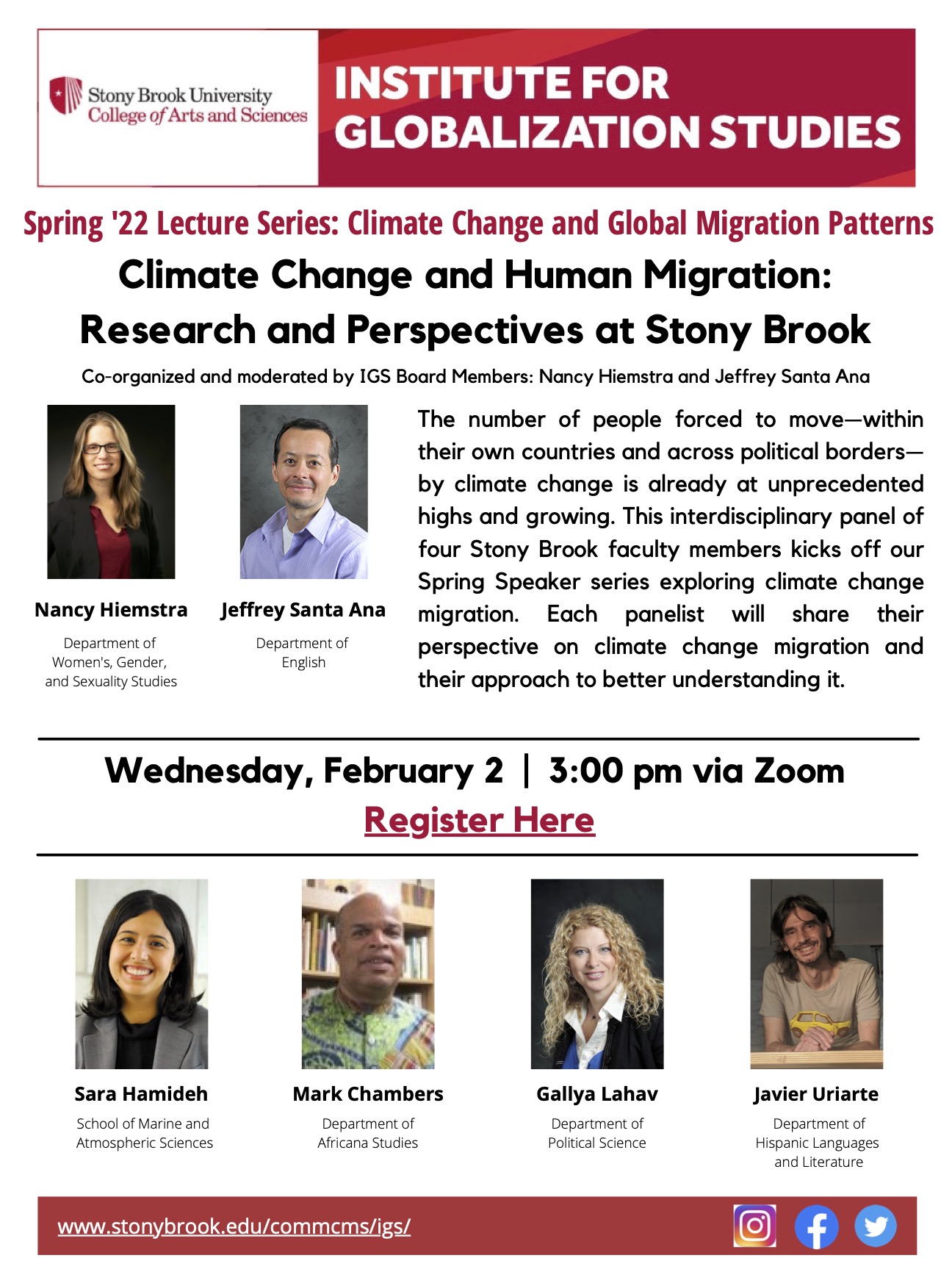
The number of people forced to move—within their own countries and across political borders—by climate change is already at unprecedented highs and growing. An interdisciplinary panel of Stony Brook faculty members shared their perspectives on climate change migration and their approach to better understanding it.
Co-organized and moderated by IGS Board Members: Nancy Hiemstra (Department of Women’s, Gender, and Sexuality Studies) and Jeffrey Santa Ana (Department of English).
You can view a recording of the event here.
Fall 2021 Lecture Series: Globalization Across Time and Place
This series of three lectures urges us to think about globalization beyond our usual interpretation of it as a twentieth-century phenomenon and consider how global connections and interactions developed in the early modern world and earlier.
Mana Kia (Associate Professor of Middle Eastern, South Asian, and African Studies, Columbia University)
Friday, November 5, 2021
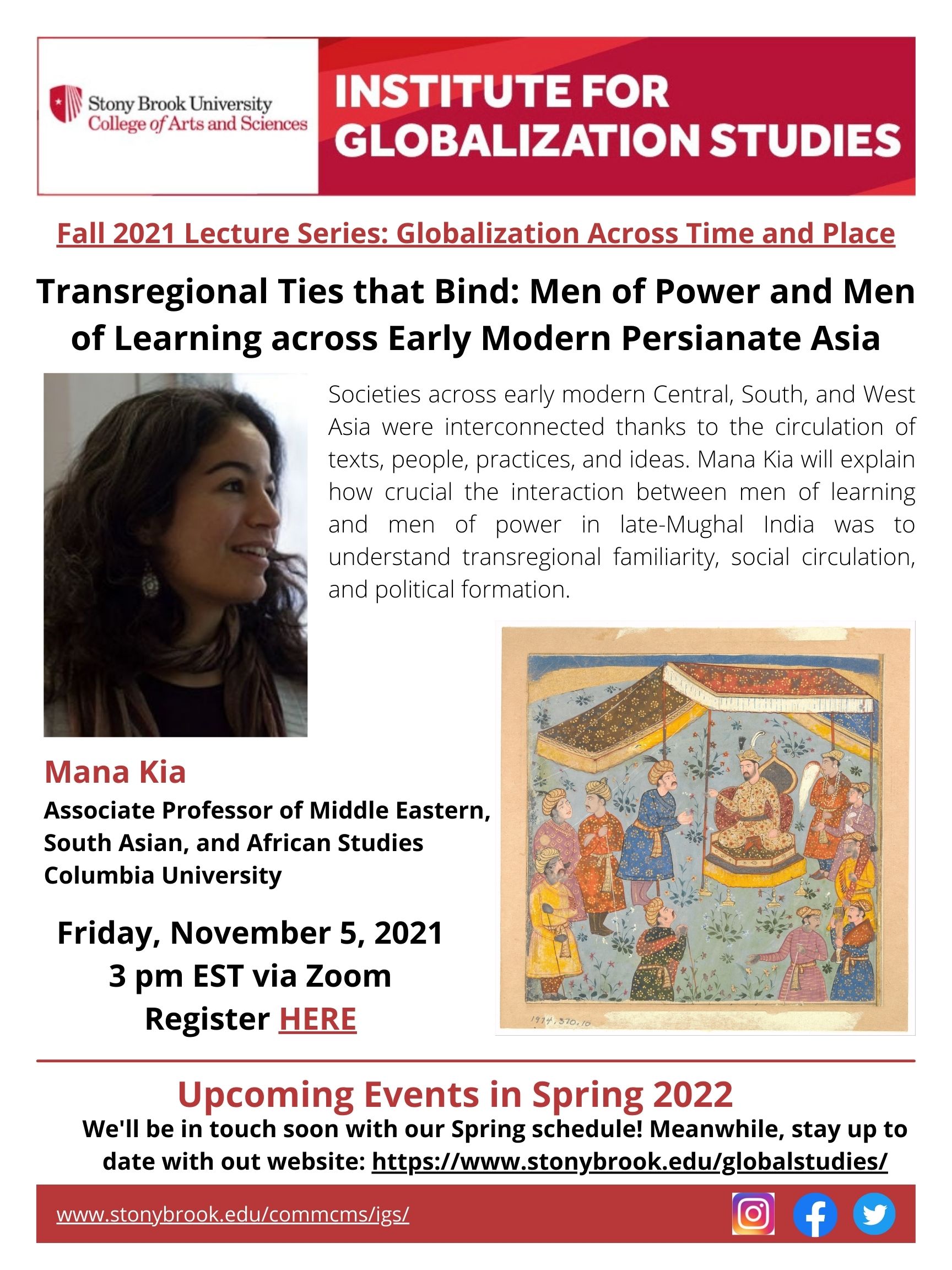
Drawing on research from her book Persianate Selves (2020) Mana Kia discussed how societies across early modern Central, South, and West Asia were interconnected thanks to the circulation of texts, people, practices, and ideas. The interaction between men of learning and men of power in late-Mughal India was crucial to understanding transregional familiarity, social circulation, and political formation.
You can view a recording of the event here.
Miguel Martínez (Professor of Spanish Literature, University of Chicago)
Friday, October 8, 2021
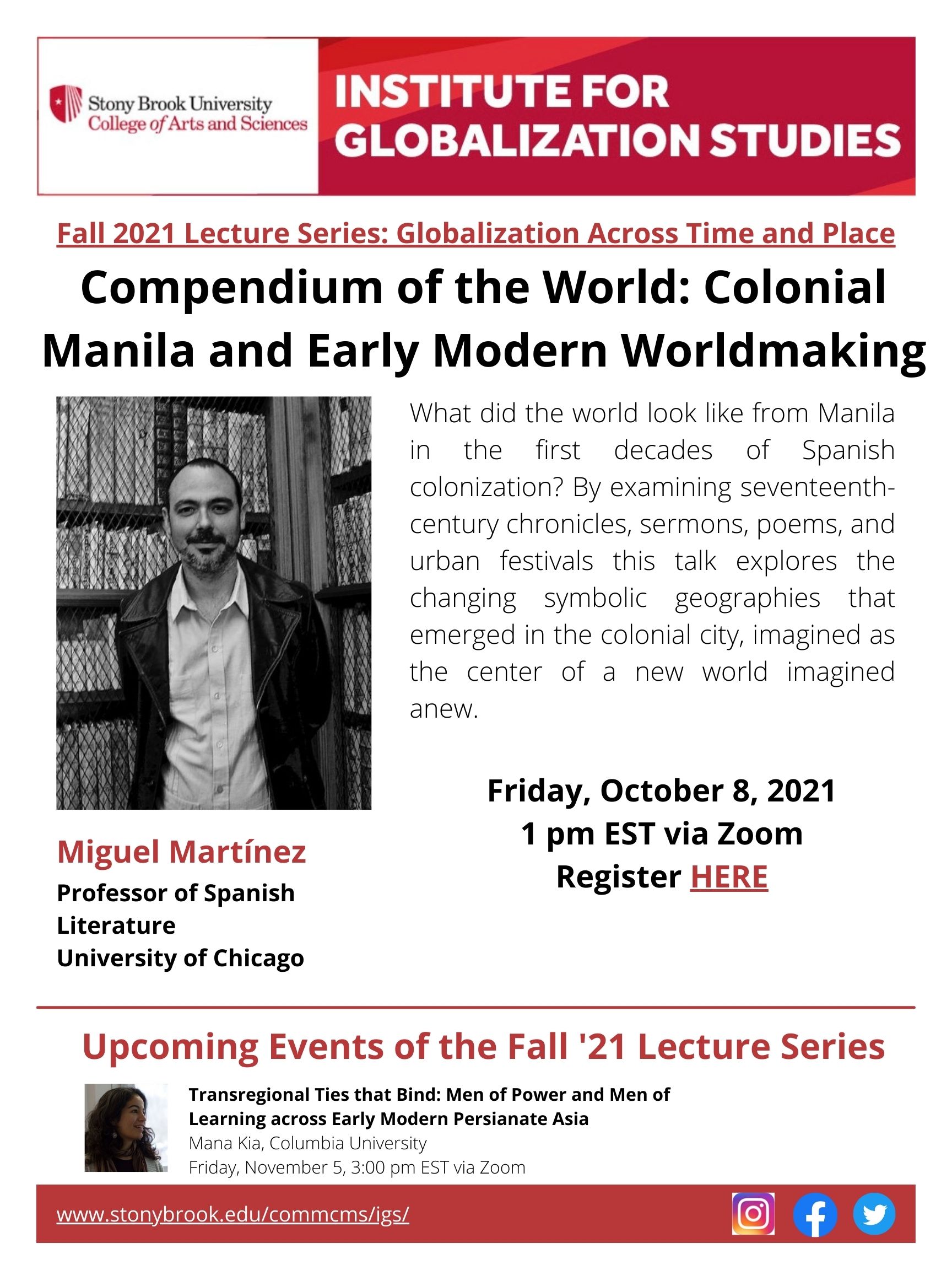
Miguel Martínez discussed what the world looked like from Manila in the first decades of Spanish colonization. By examining seventeenth-century chronicles, sermons, poems, and urban festivals this talk explored the changing symbolic geographies that emerged in the colonial city, imagined as the center of a new world imagined anew.
You can view a recording of the event here.
Valerie Hansen (Stanley Woodward Professor of History, Yale University)
Distinguished historian Valerie Hansen discussed her book The Year 1000: When Explorers Connected the World - And Globalization Began, in which she shows how bold explorations and daring trade missions first connected all of the world's societies at the end of the first millennium. Drawing on nearly thirty years of research, she presents acompelling account of first encounters between disparate societies, which sparked conflict and collaboration eerily reminiscent of our contemporary moment.
You can view a recording of the event here.
Spring 2021 Lecture Series: Global Justice and Injustice
These two lectures consider criminal justice and incarceration from global perspectives, including discussions of neocolonial state violence, and of carceral sites as places of environmental injustice.
Kamari Maxine Clarke (Professor of Anthropology, University of California, Los Angeles/University of Toronto)
Thursday, April 8, 2021
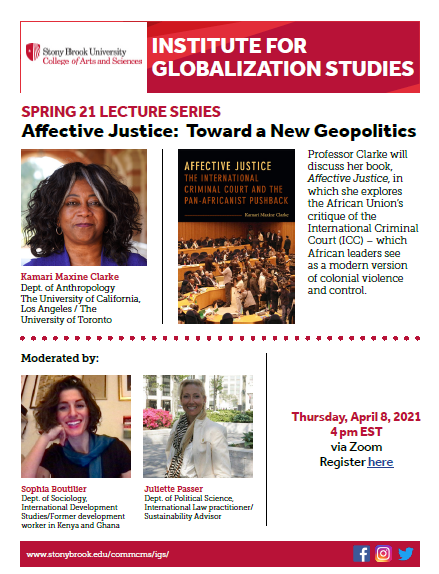
Professor Kamari Maxine Clarke discussed her book, Affective Justice, in which she explores the African Union's critique of the International Criminal Court (ICC) - which African leaders see as a modern version of colonial violence and control.
Moderated by Sophia Boutlier (Dept. of Sociology, International Development Studies/Former development worker in Kenya and Ghana) and Juliette Passer (Dept. of Political Science, International Law practitioner/ Sustainability Advisor)
David Pellow (Professor of Environmental Studies and Director of the Global Environmental Justice Project, the University of California, Santa Barbara)
Wednesday, February 17, 2021
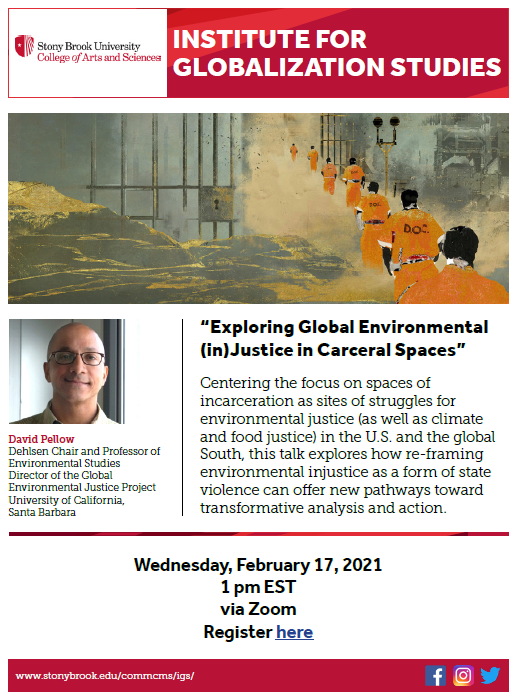
Centering the focus on spaces of incarceration as sites of struggles for environmental justice (as well as climate and food injustice) in the US and the global South, this talk explores how re-framing environmental injustice as a form of state violence can offer new pathways toward transformative analysis and action.
Faculty, Student, and Alumni Roundtables
In these panels, Globalization Studies faculty, students, and alumni discuss career options in globalization studies, issues in global development, and activism.
Uzochi Jean-Philippe II, ‘18 (BA Africana Studies and Asian and Asian American Studies, Gilman Scholar) Fulbright scholar completing his second year as an English Teaching Instructor in Taiwan
Mehtasim Mahfuz, ‘15 (BA Asian and Asian American Studies) Currently completing her law degree at Albany Law School with a concentration in immigration and international human rights
Ross Medico, ‘13 (BA History and Political Science, Gilman and Fulbright Scholar) MA in Conflict Management and International Economics from Johns Hopkins School of Advanced International Studies (SAIS) Managing Editor and Senior Researcher at the Korea Data and History Initiative at SAISWednesday, March 31, 2021
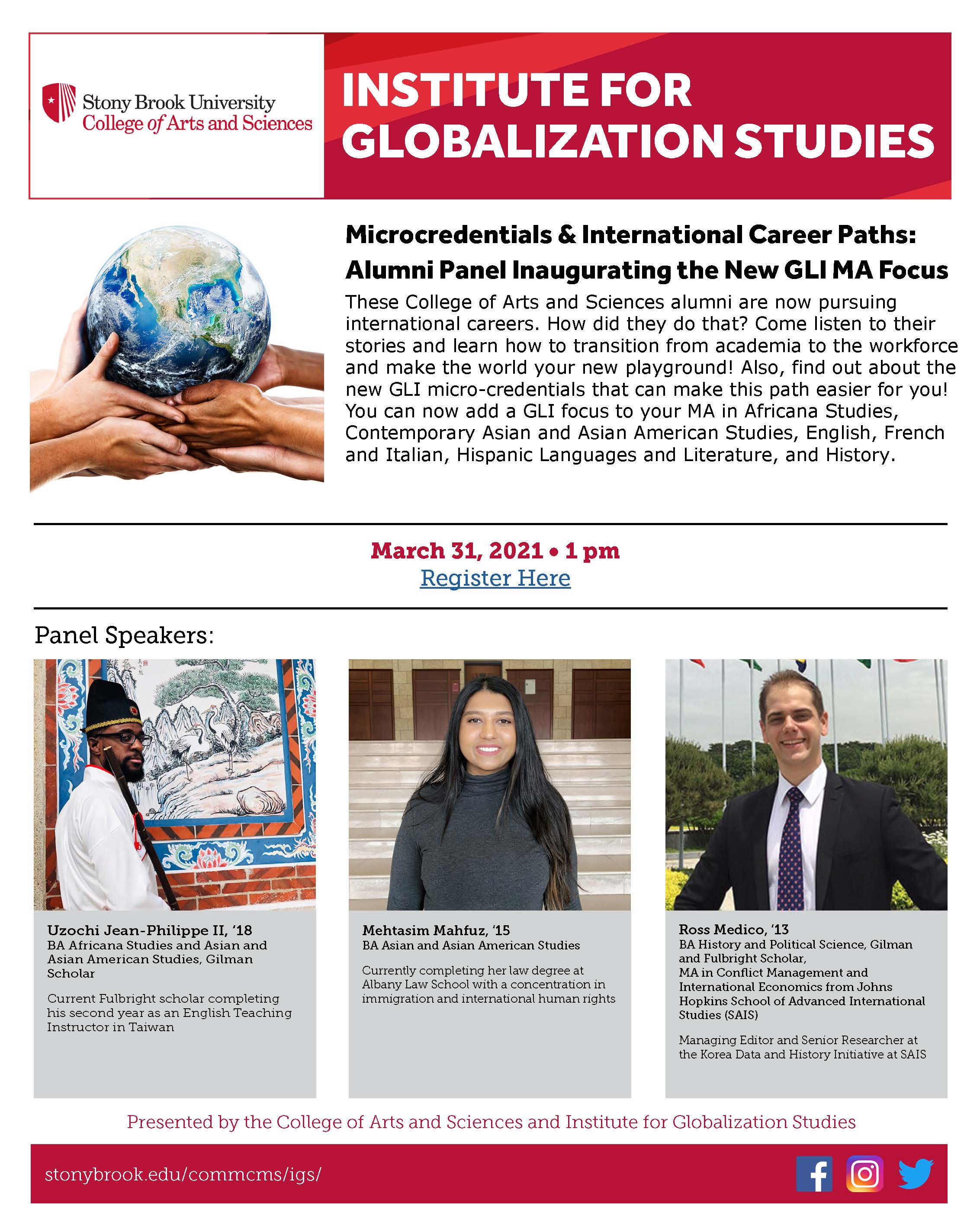
We featured three SBU alumni who went from graduating with an academic degree from our College of Arts and Sciences--History, Africana Studies, and Asian and Asian-American Studies--to pursuing an international career. How did they do that?
To learn how to transition from academia to the workforce and make the world your new playground, come and listen to their stories. Now with the GLI degrees, this path is made easier for you. With a BA in GLI or a GLI focus added to your MA in Contemporary Asian and Asian American Studies, Africana Studies, English, French and Italian, Hispanic Languages and Literature or in History, you will be prepared from the start!
Fernando Amador (History)
Maria Grima (School of Marine and Atmospheric Science)
Jessica Kim (Sociology)
Xiaoning Wu (School of Marine and Atmospheric Science)Wednesday, February 10, 2021
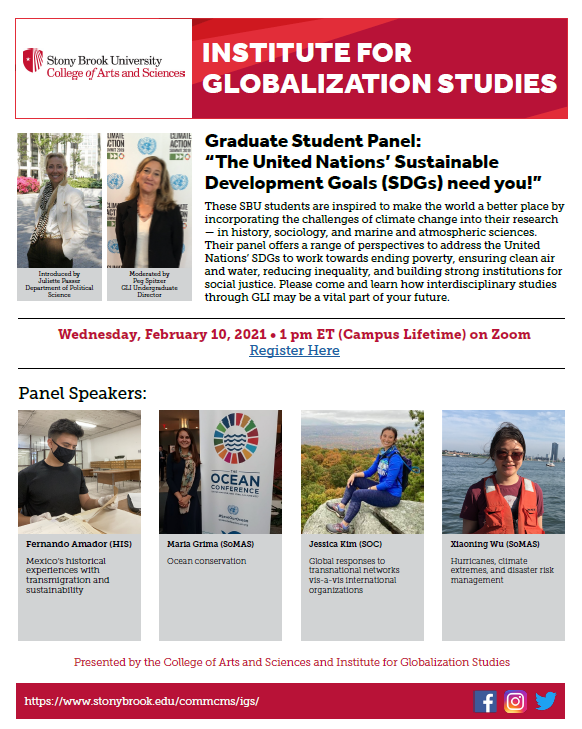
These Stony Brook graduate students are inspired to make the world a better place by incorporating the challenges of climate change into their research - in history, sociology, and marine and atmospheric sciences. Their panel offers a range of perspectives to address the United Nations' Sustainable Development Goals to work towards ending poverty, ensuring clean air and water, reducing inequality, and building strong institutions for social justice. Learn how interdisciplinary studies through GLI may be a vital part of your future.
Maureen Ahmed (Foreign Affairs Officer, U.S. Department of State)
Steven Galson (SVP of Global Regulatory Affairs and Strategy for Amgen)
Ambassador Robert Gallucci (Distinguished Professor in the Practice of Diplomacy, Walsh School of Foreign Service, Georgetown University)
Jay Korman (Managing Director, Avascent Global Technology Consulting)Wednesday, September 23, 2020
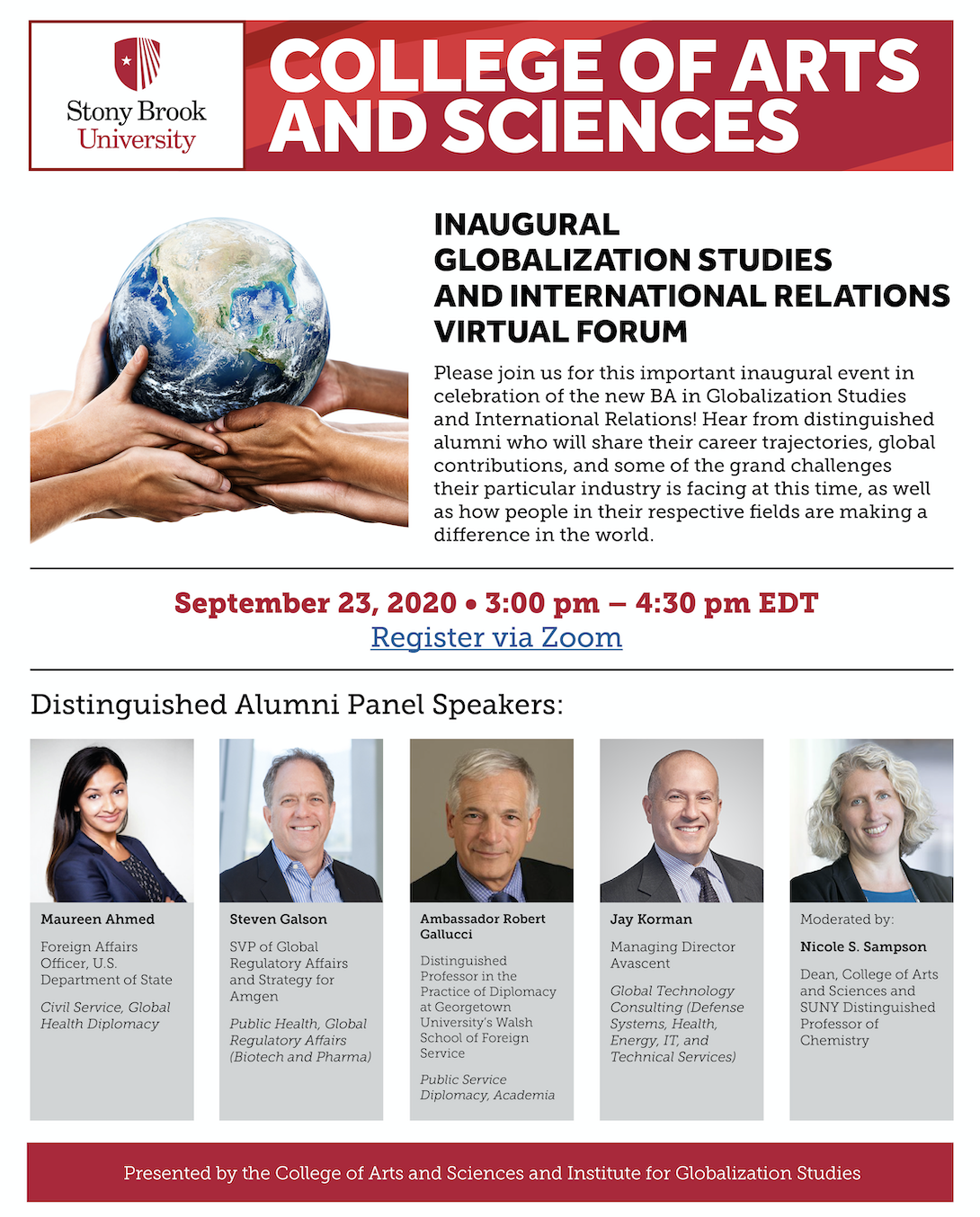
Global Studies graduates pursue numerous career paths, many going on to work with corporations, non-profits, or government agencies, as well as progressing directly on to graduate school. Hear from distinguished alumni who will share their career trajectories, global contributions, and some of the grand challenges their particular industry is facing at this time, as well as how people in their respective fields are making a difference in the world.
Moderated by Nicole Sampson, Dean of the College of Arts & Sciences, Distinguished Professor of Chemistry
Margarethe Adams (Associate Professor, Department of Music)
Rosabel Ansari (Lecturer, Department of Asian and Asian American Studies)
Mohamad Ballan (Assistant Professor, Department of History)
Eric Lewis Beverley (Associate Professor, Department of History)Thursday, November 19, 2020
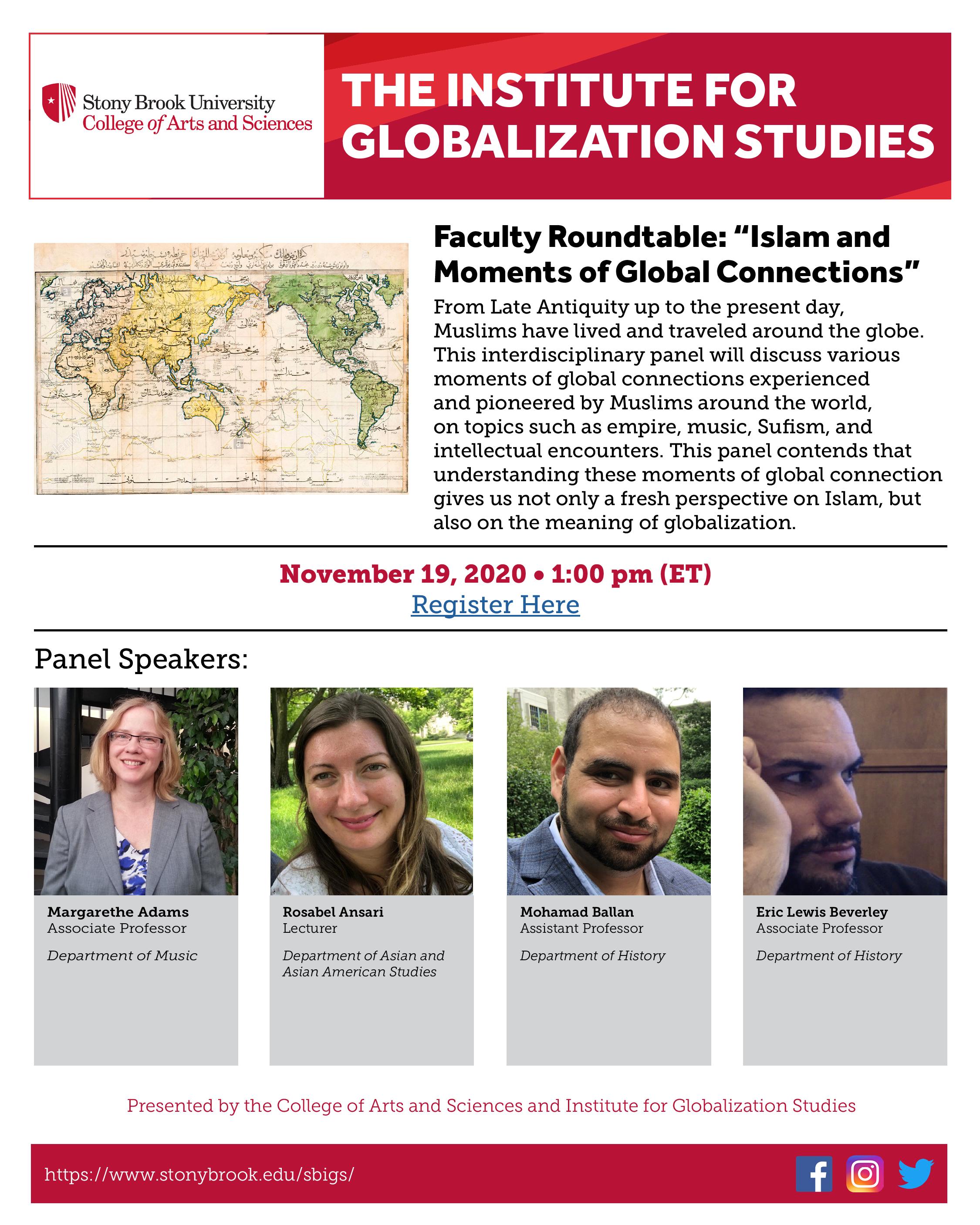
From Late Antiquity to the present, Muslims have lived and traveled around the globe. This interdisciplinary panel of Stony Brook experts discuss various moments of global connections experienced and pioneered by Muslims around the world on topis such as empire, music, Sufism, and intellectual encounters. These moments of global connection give us not only a fresh perspective on Islam, but also on the meaning of globalization.

